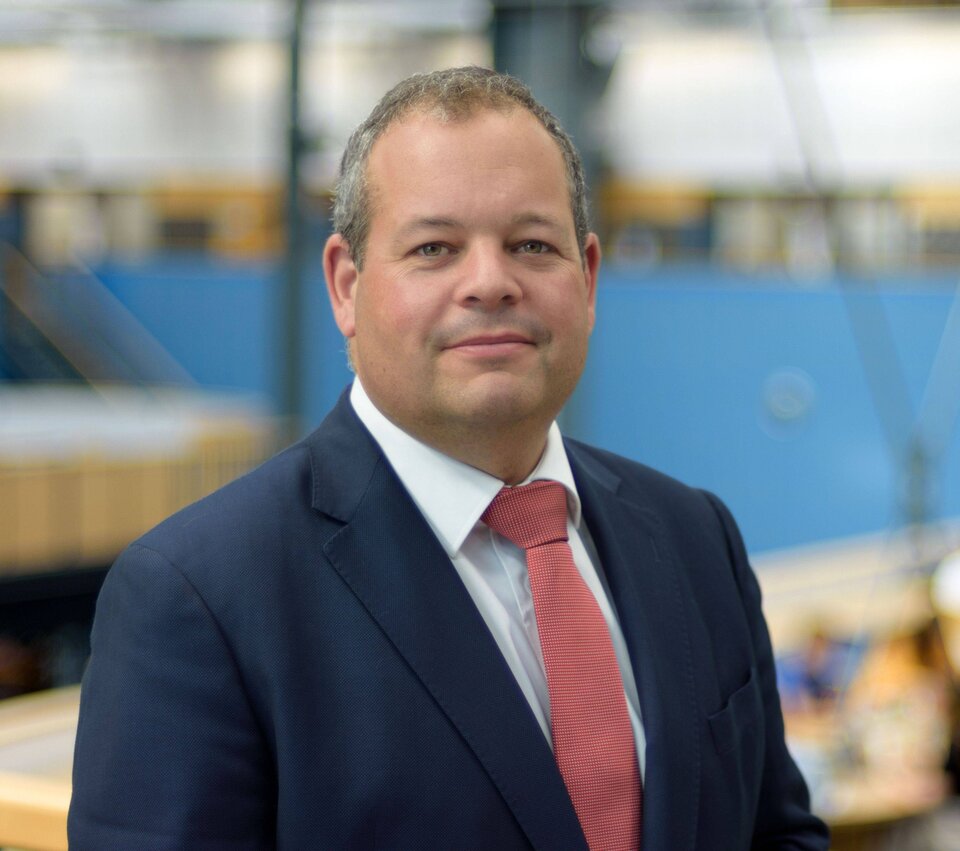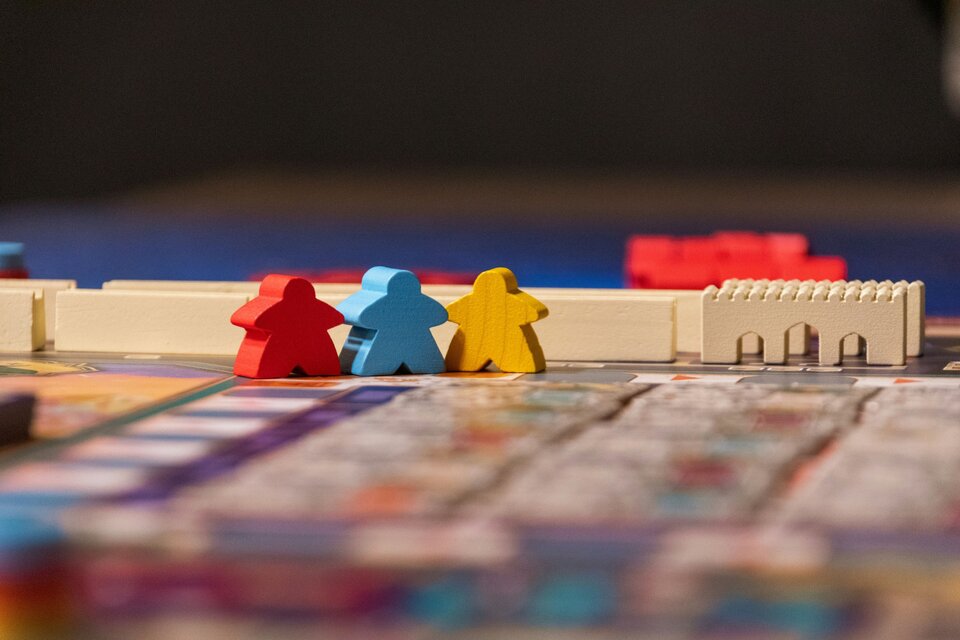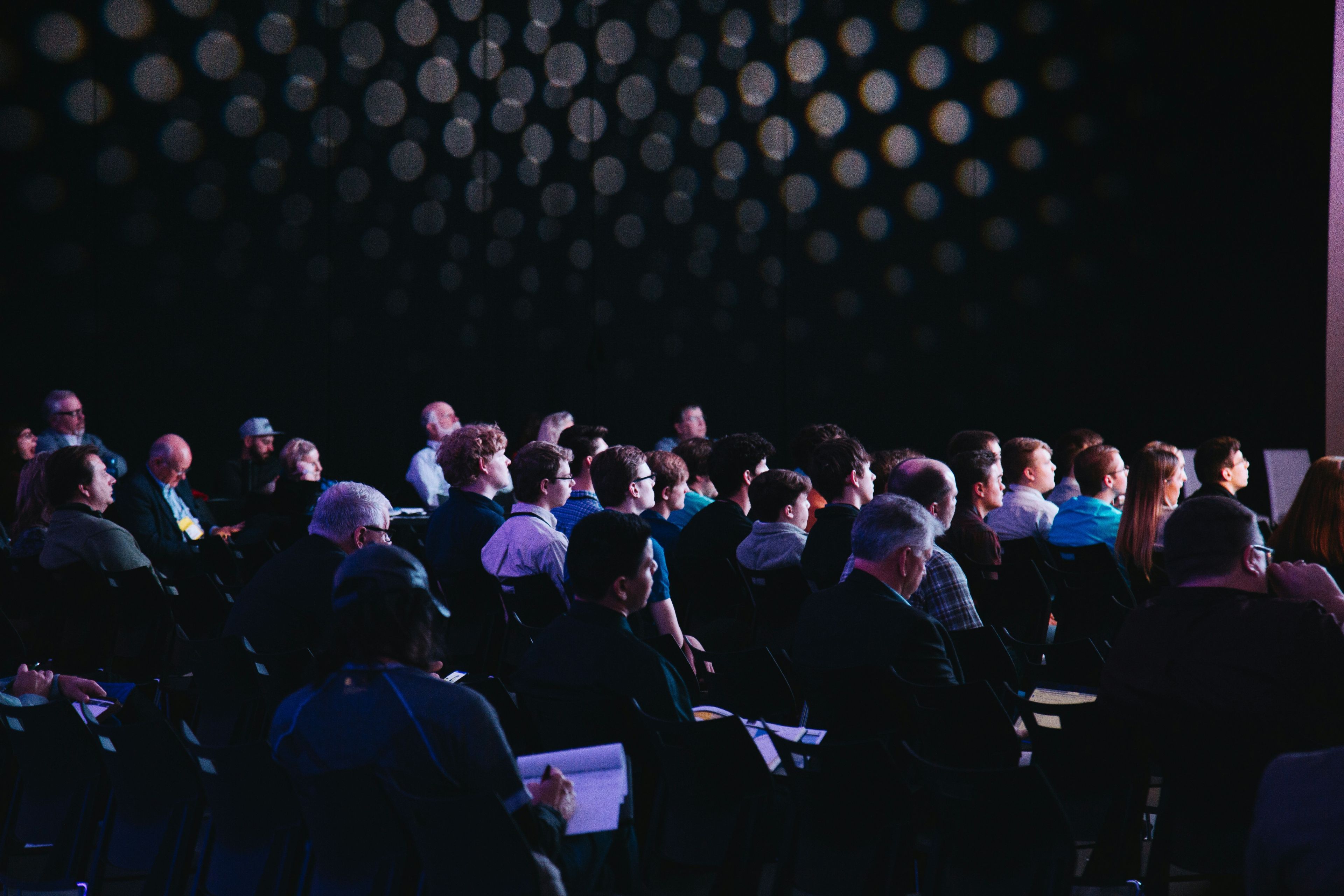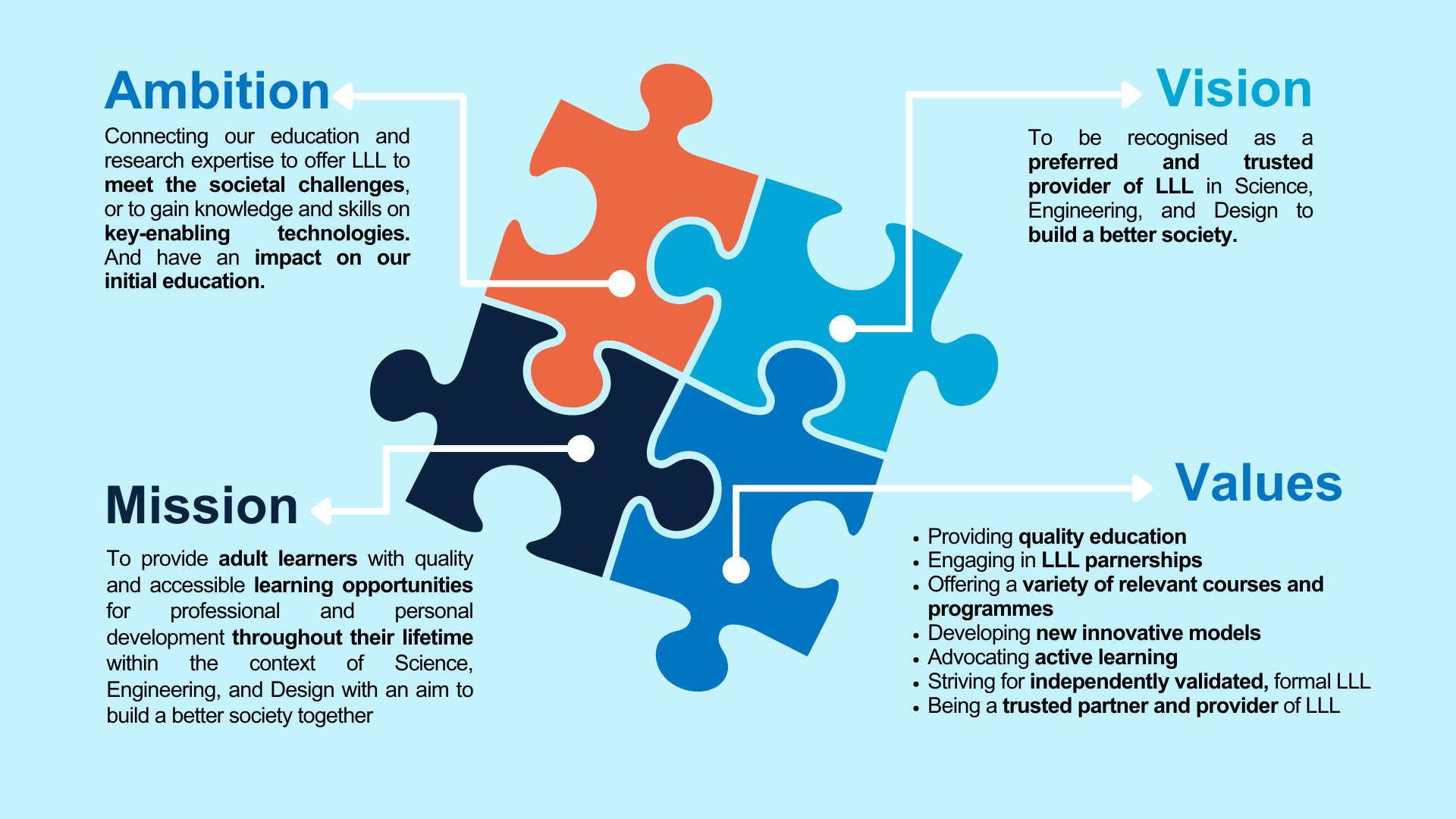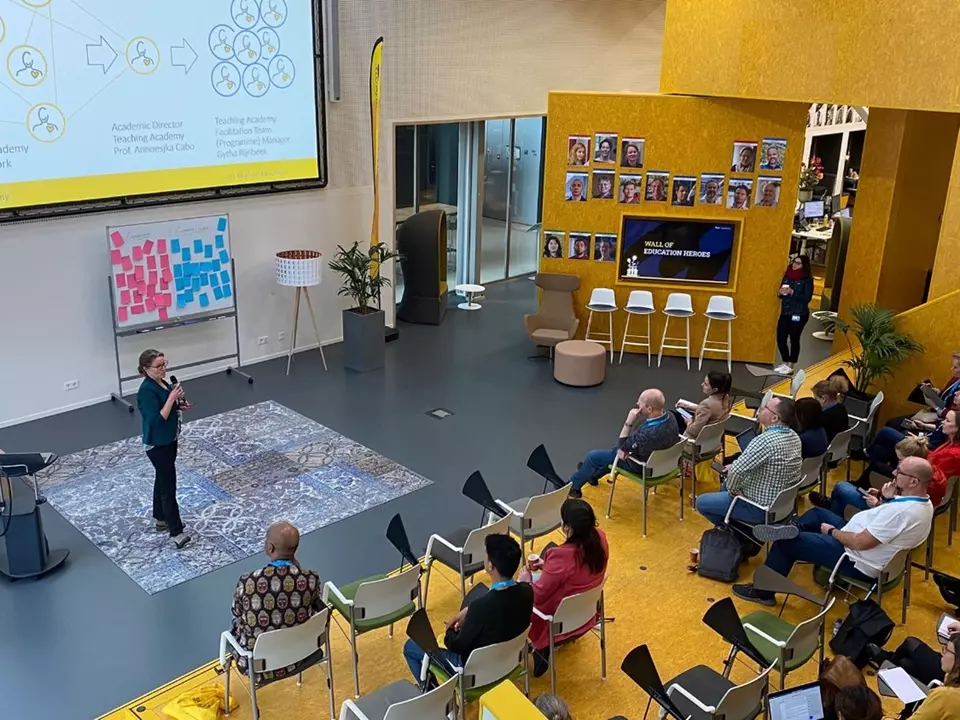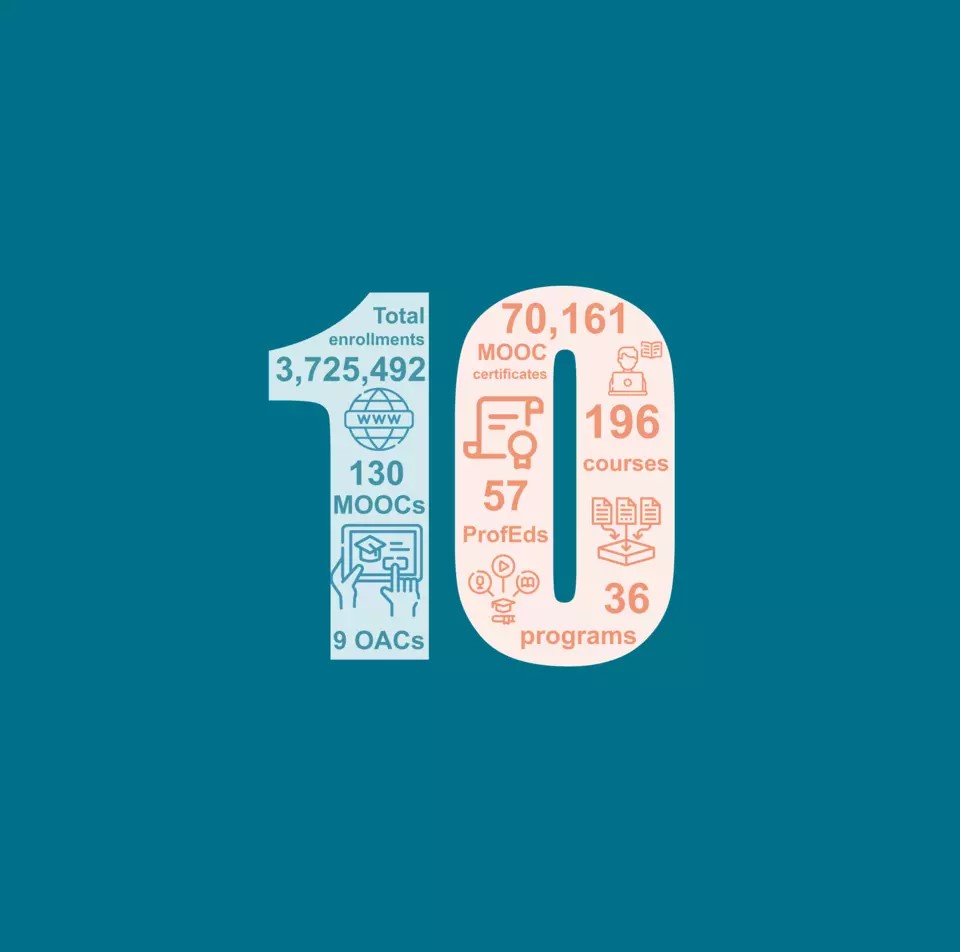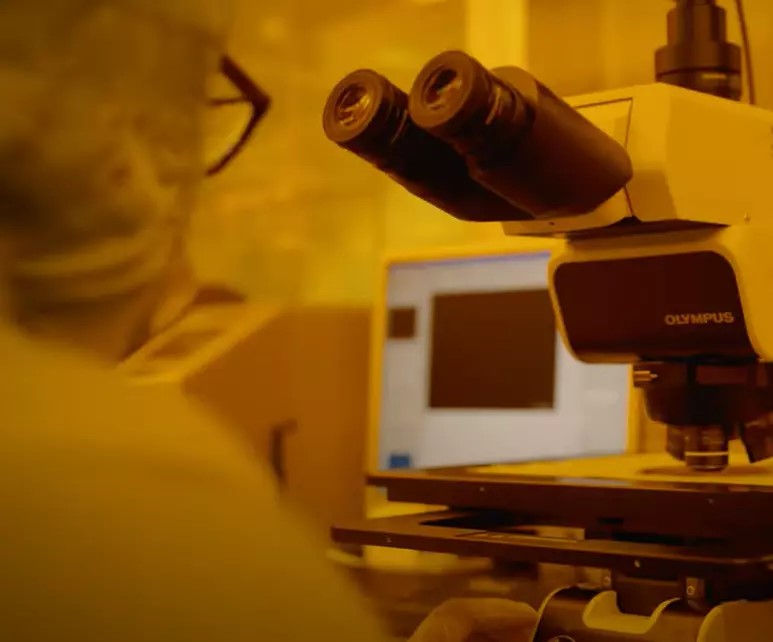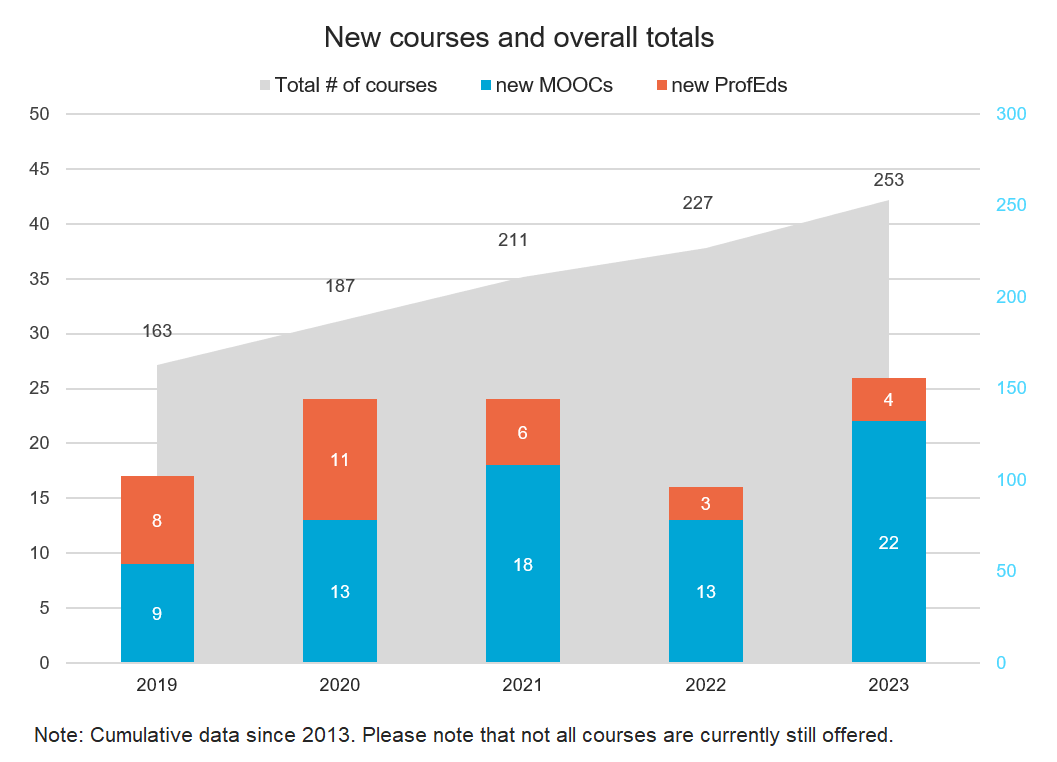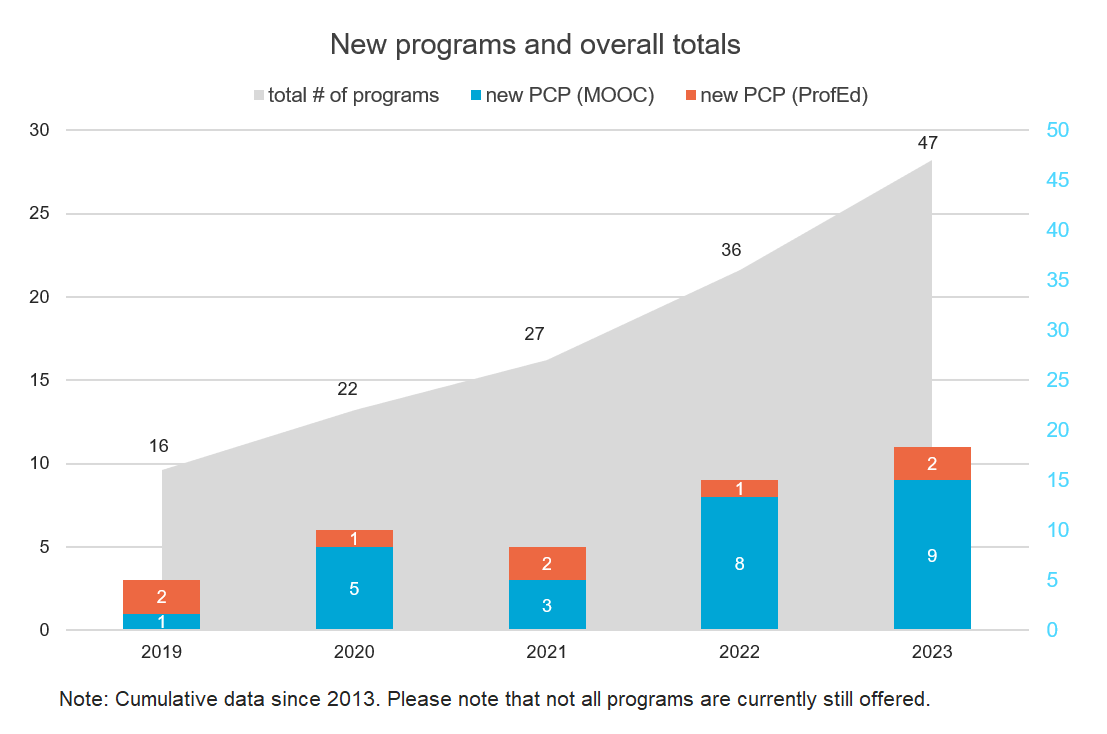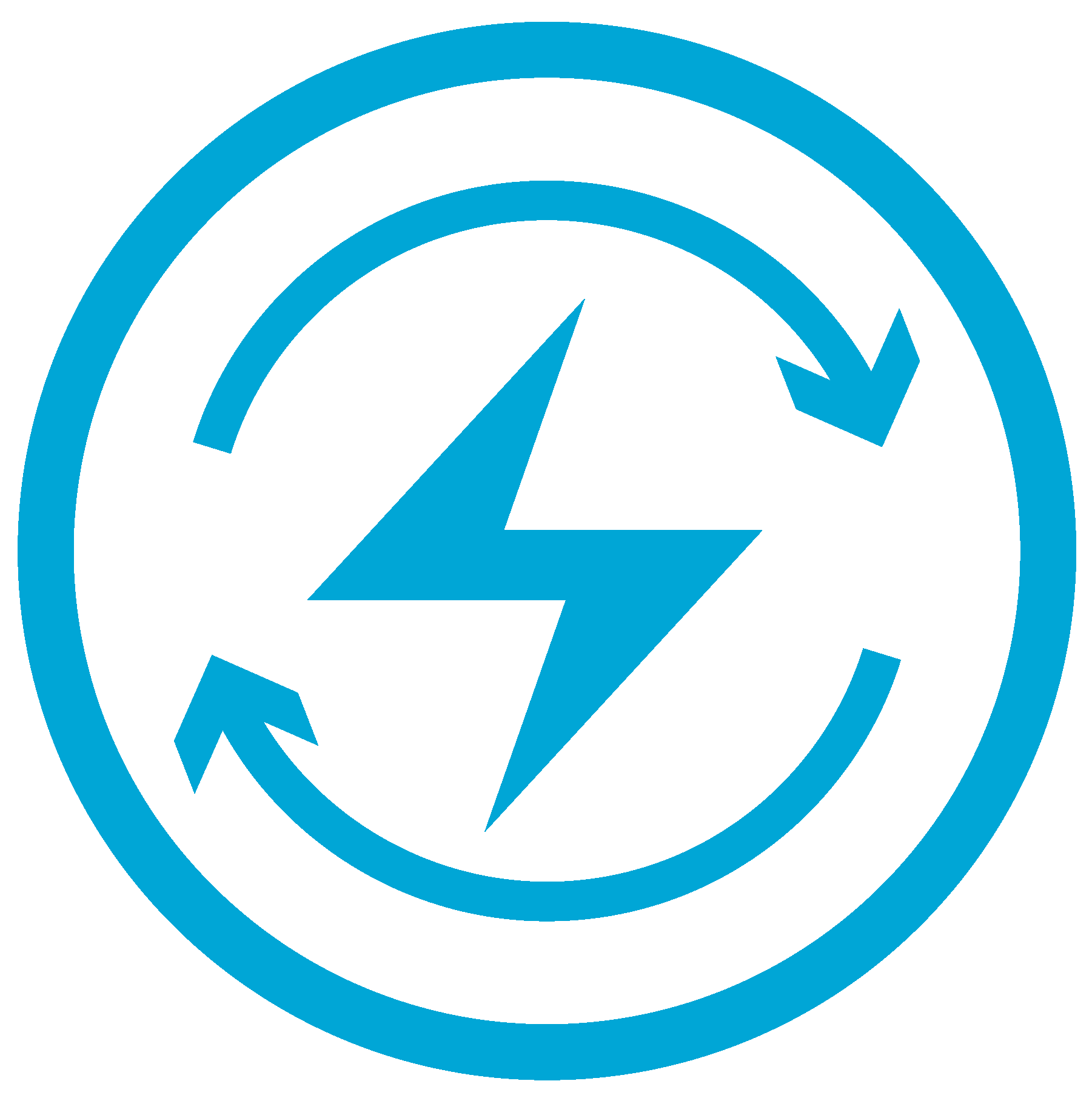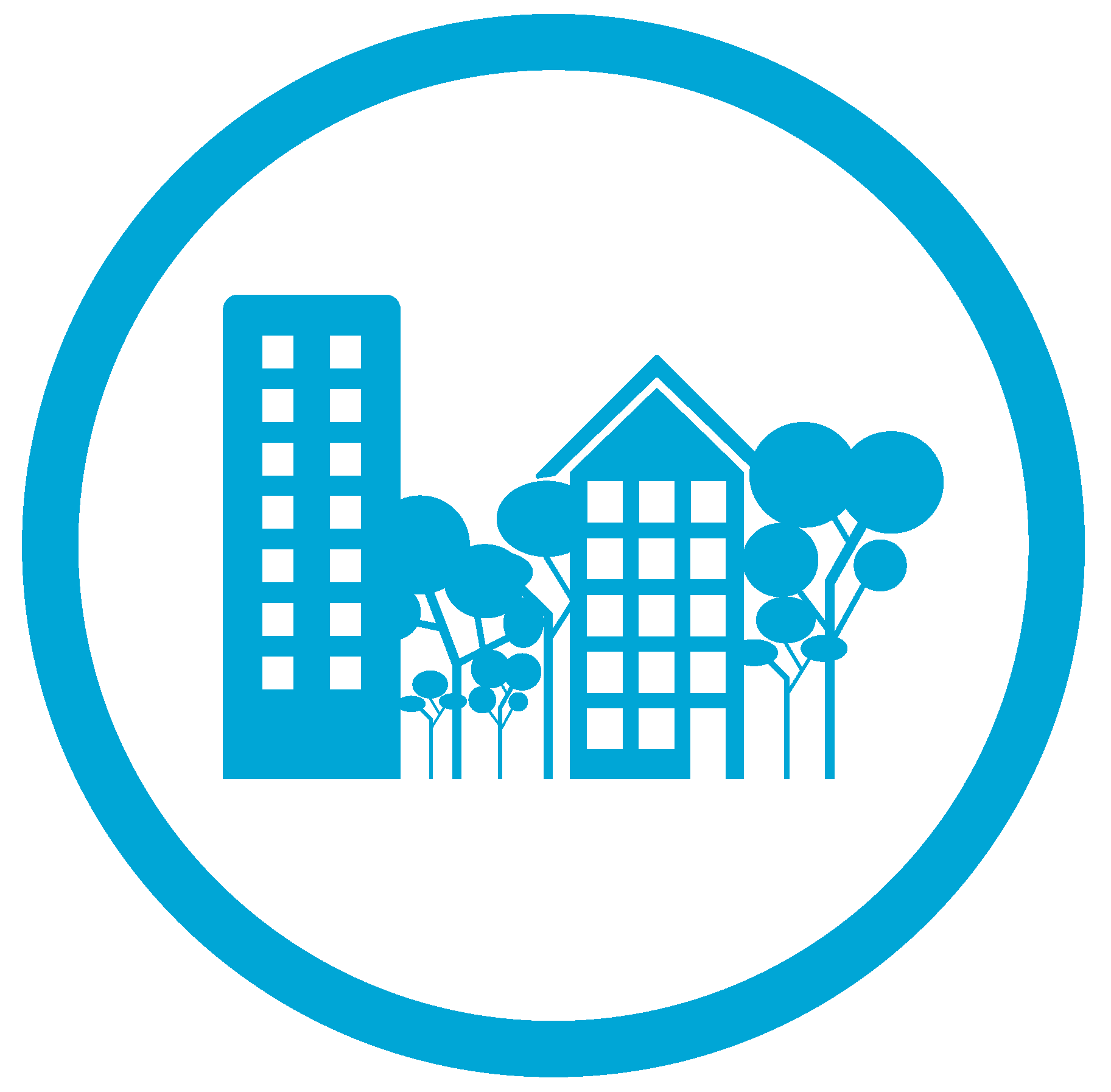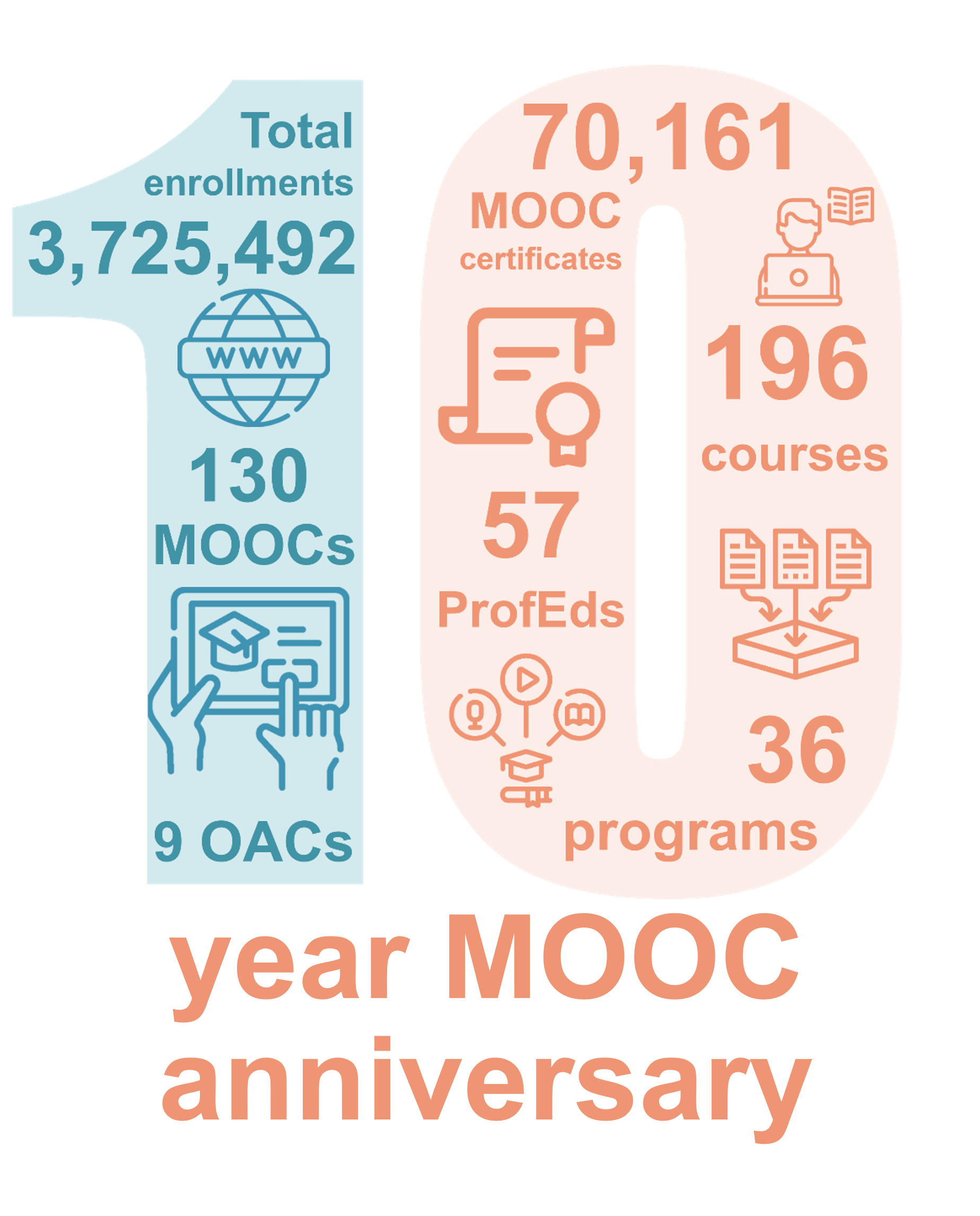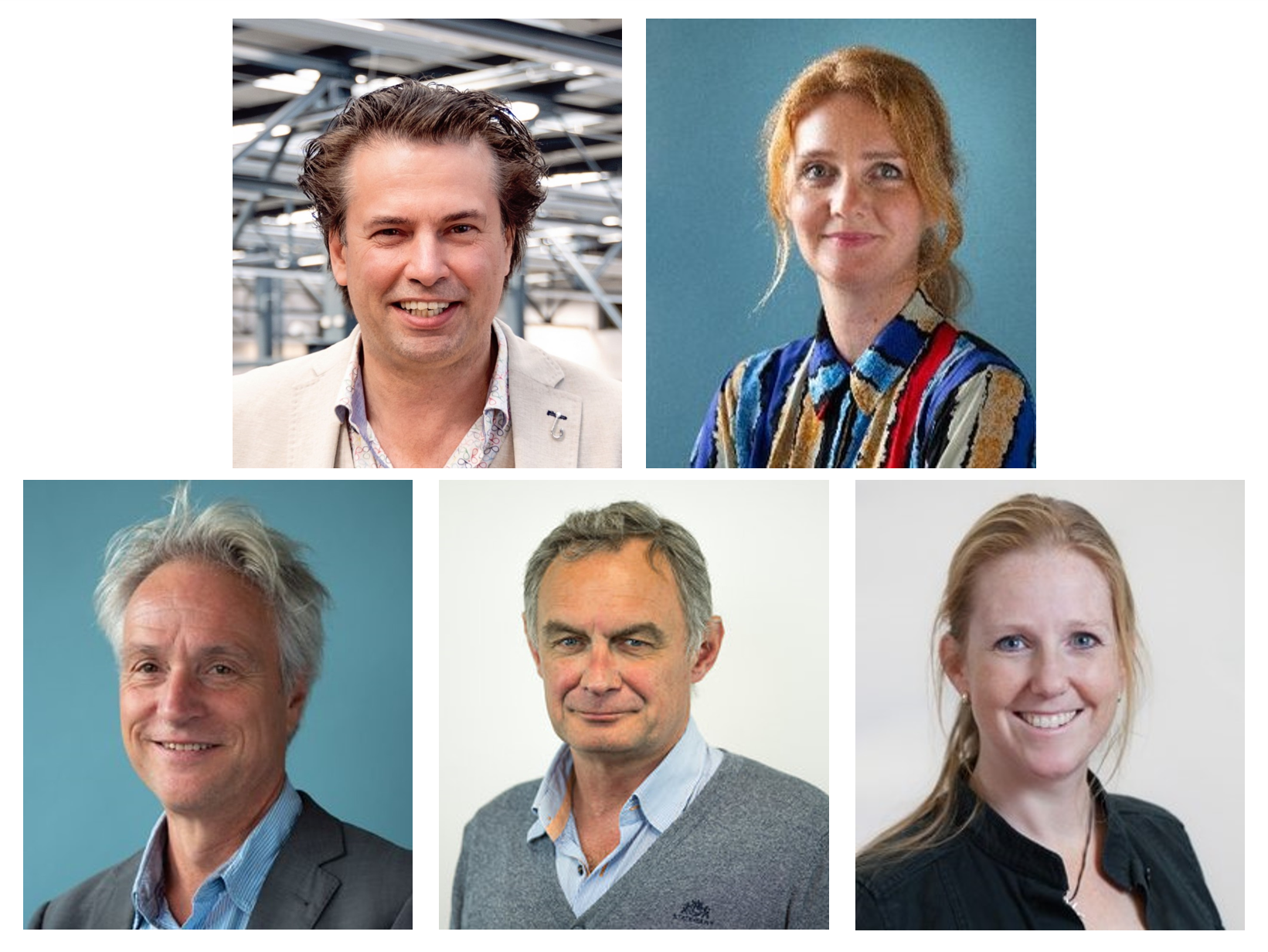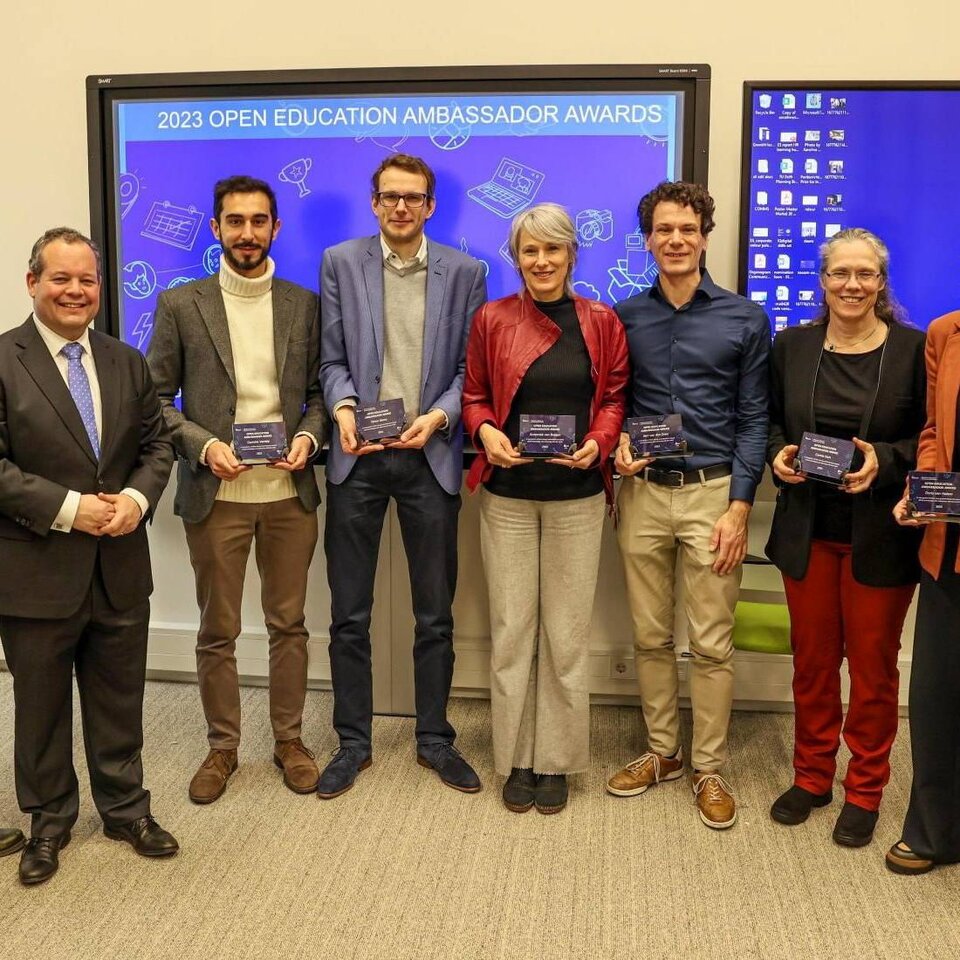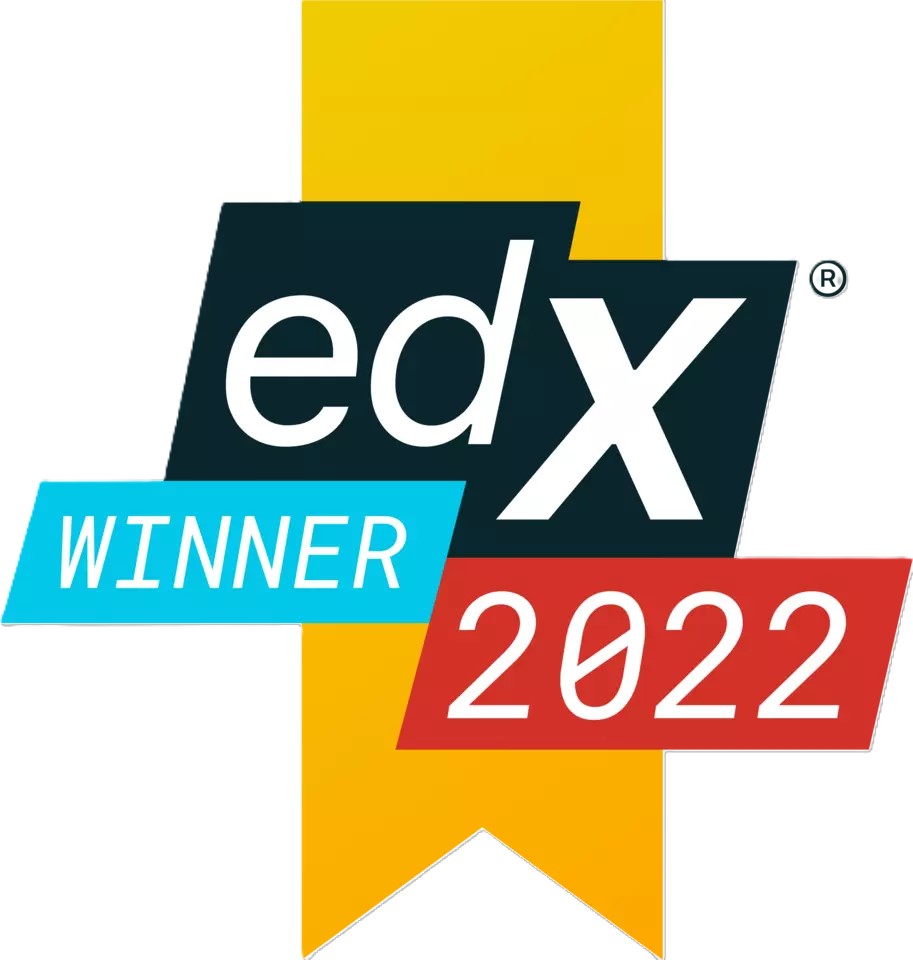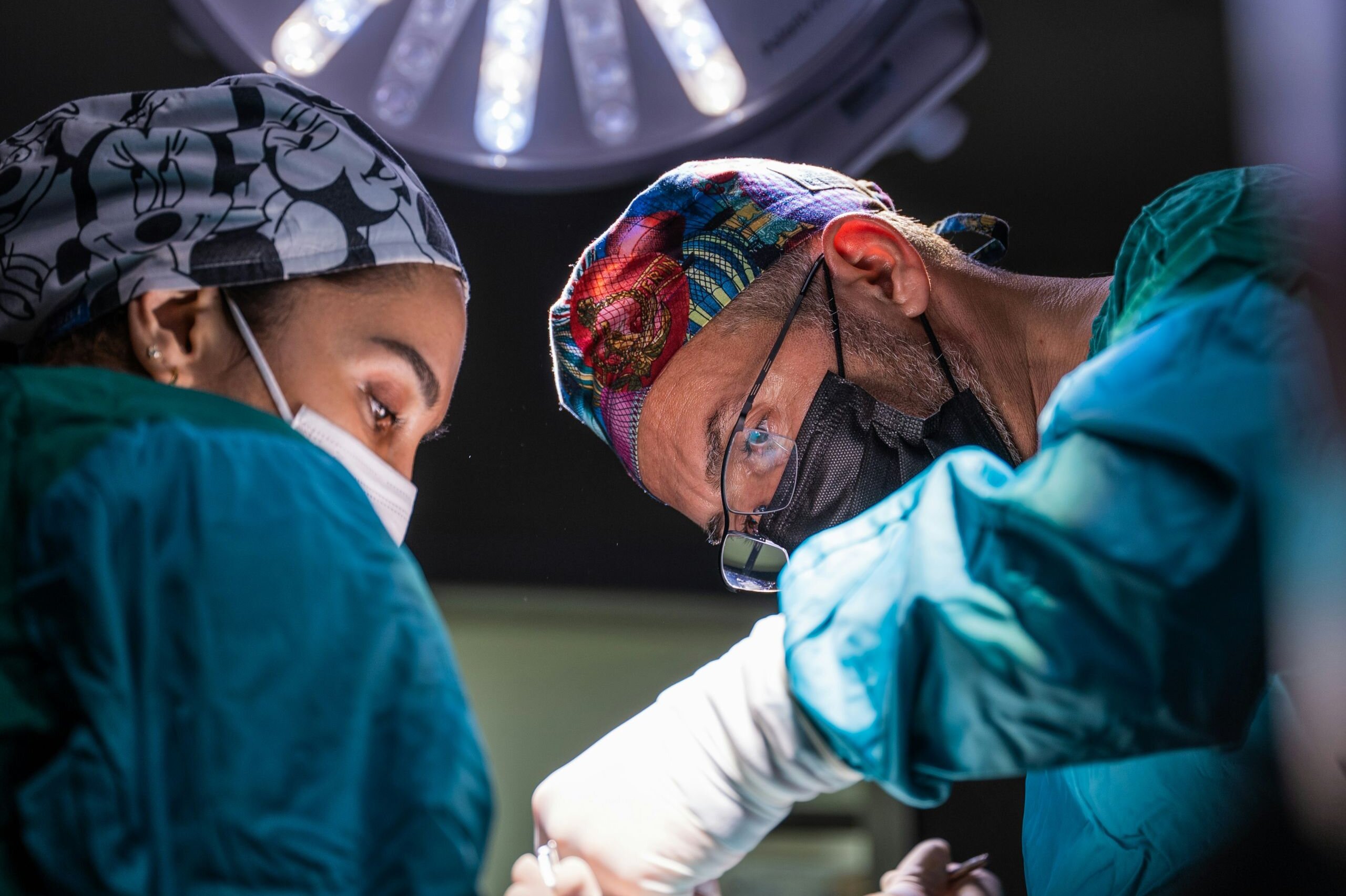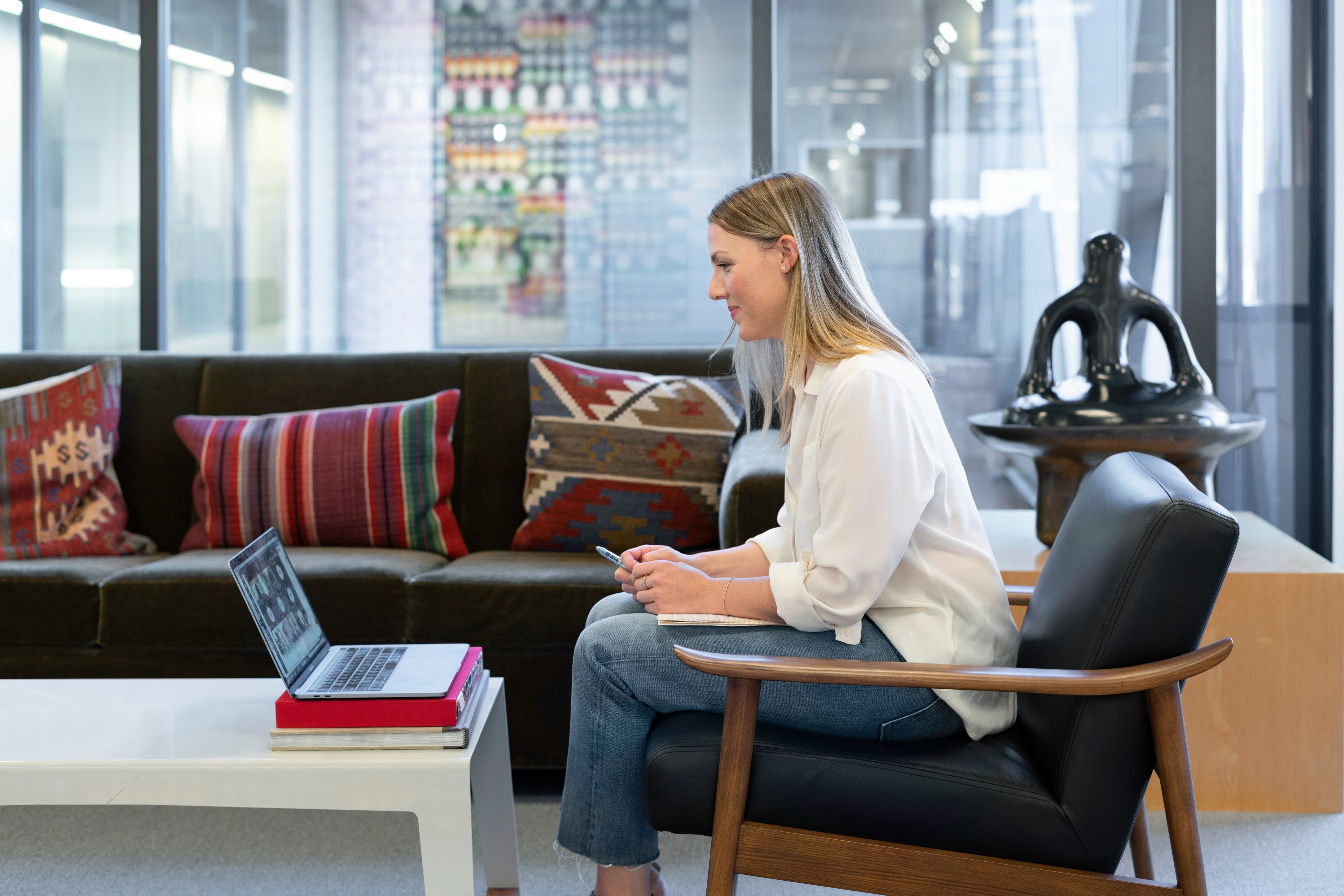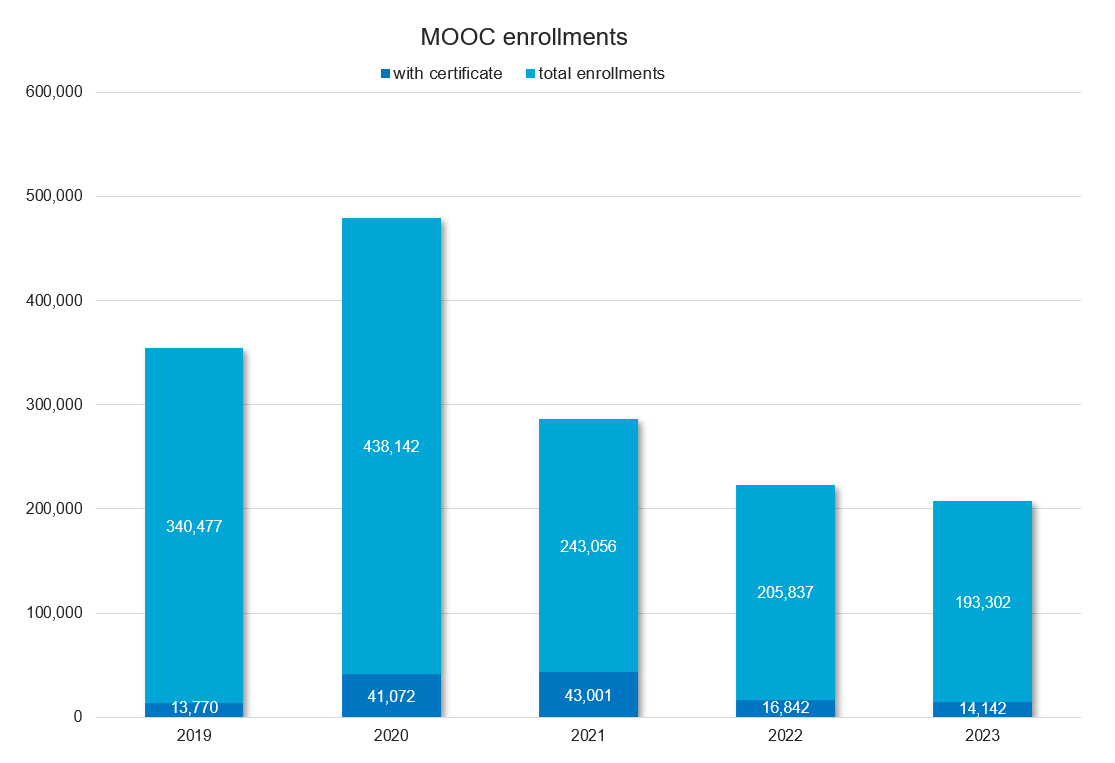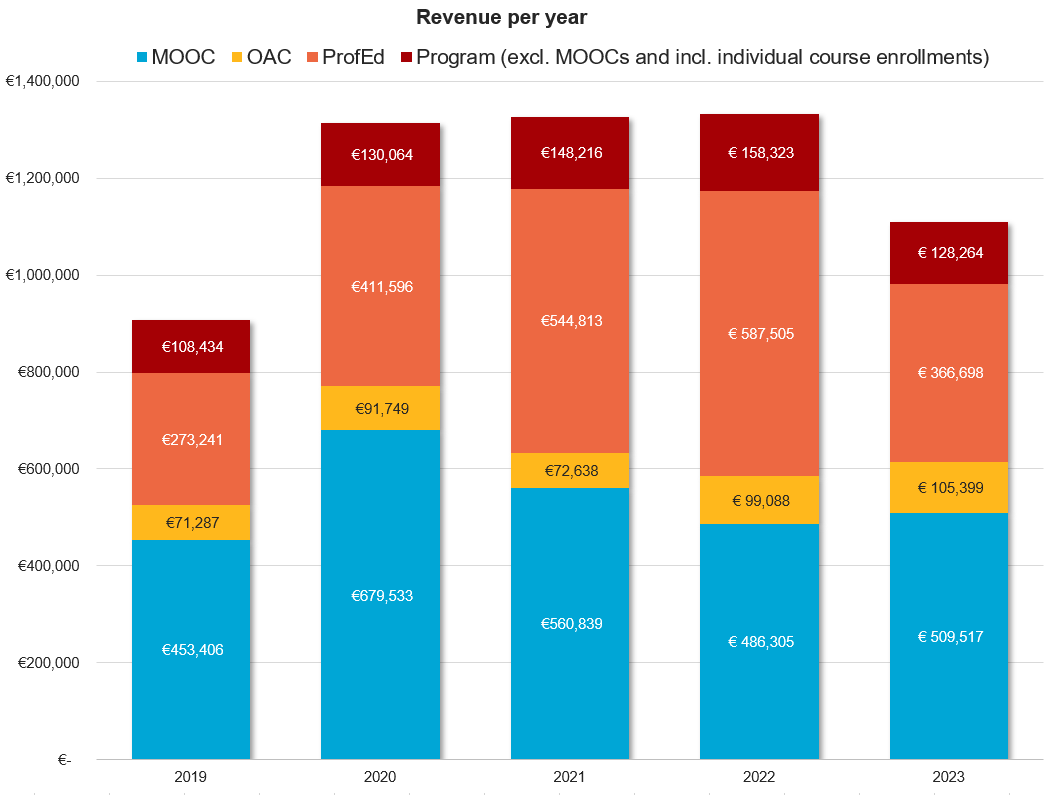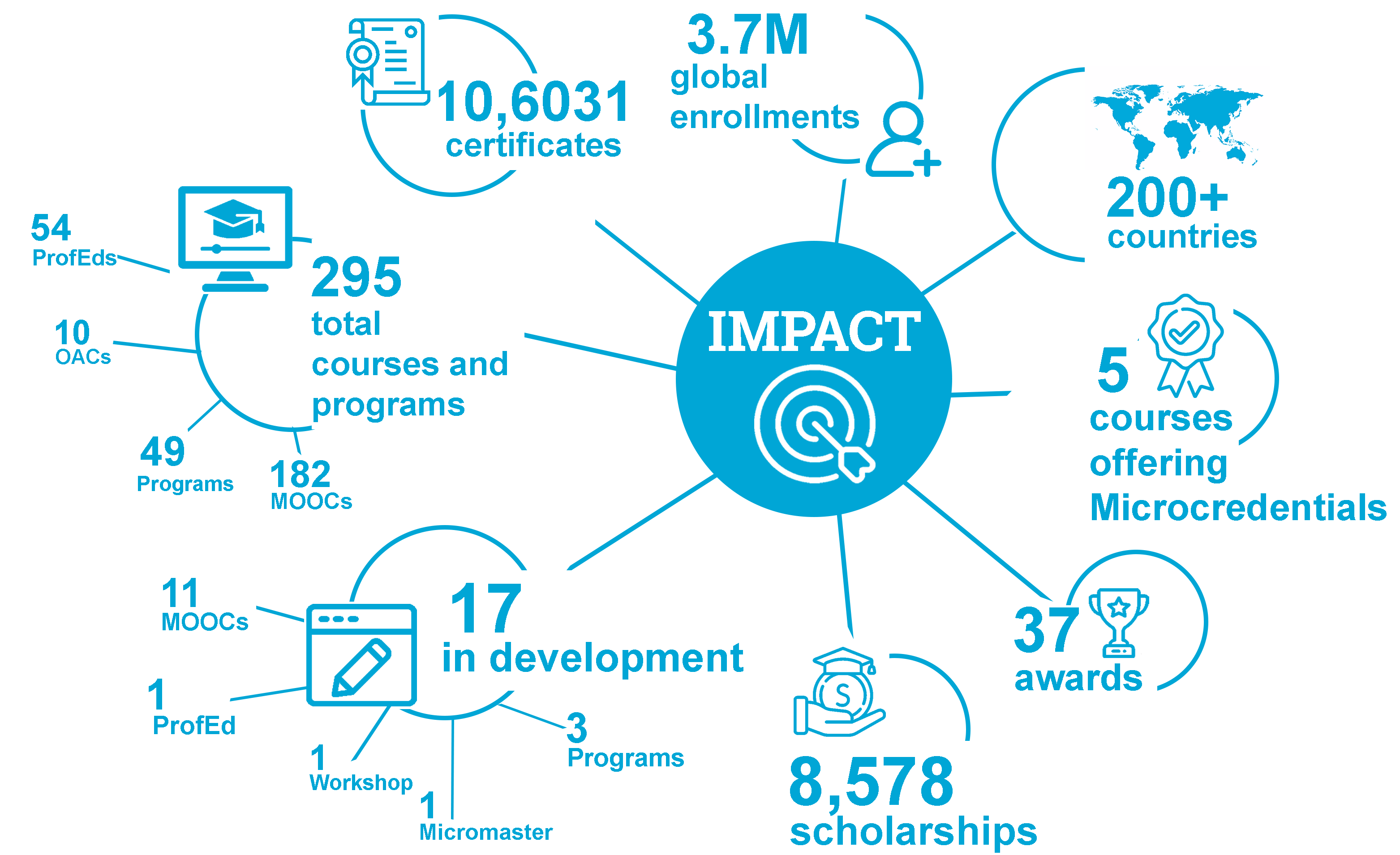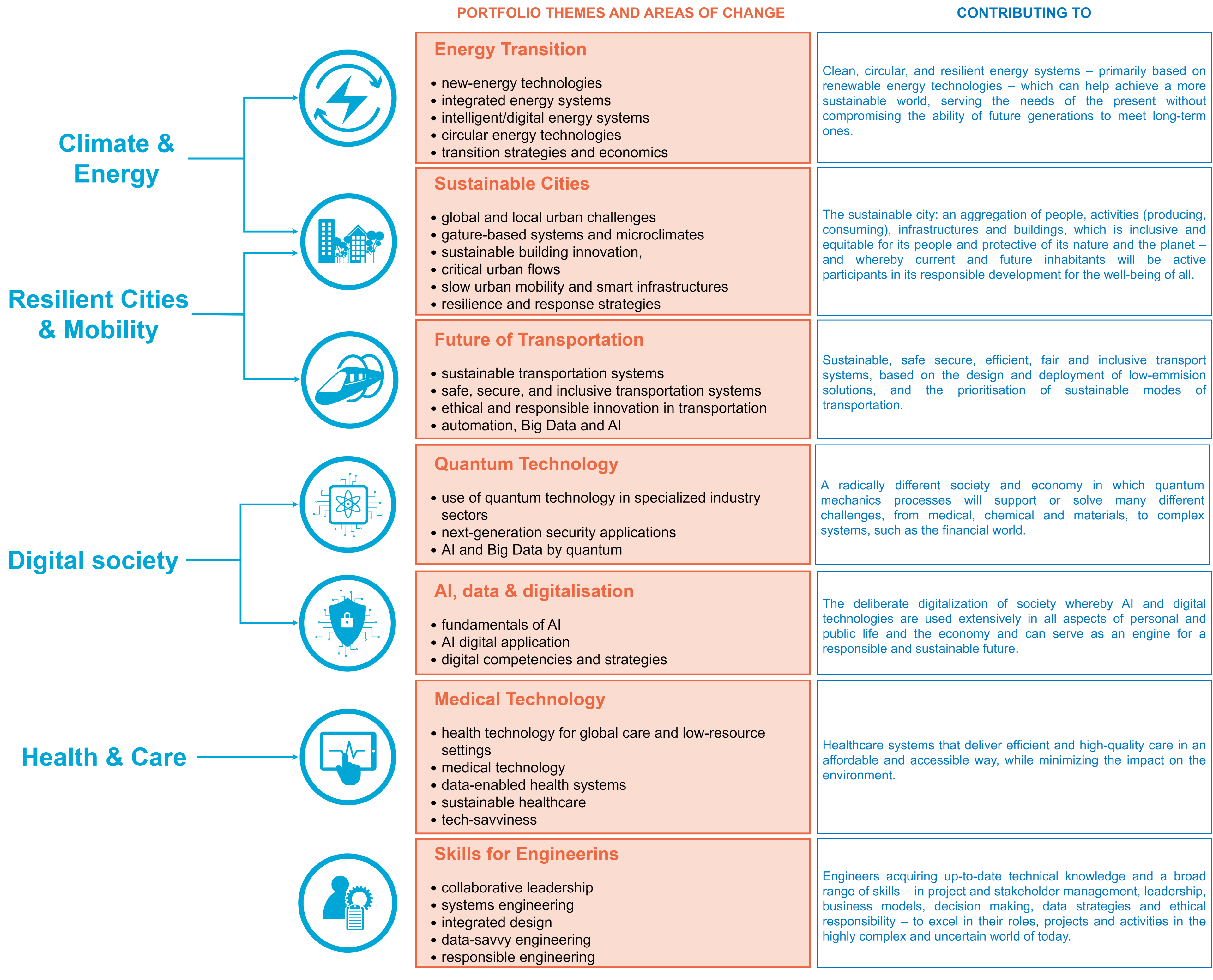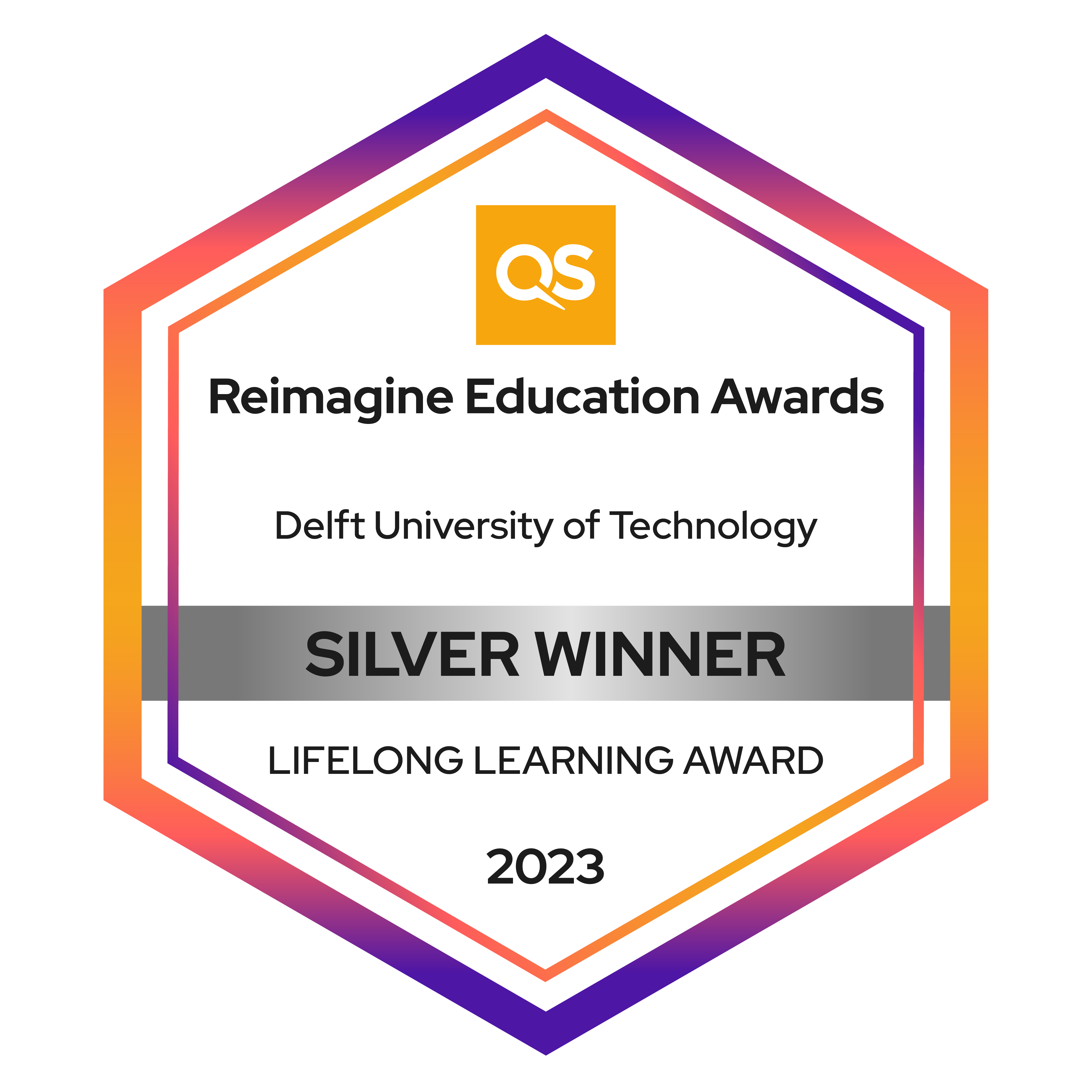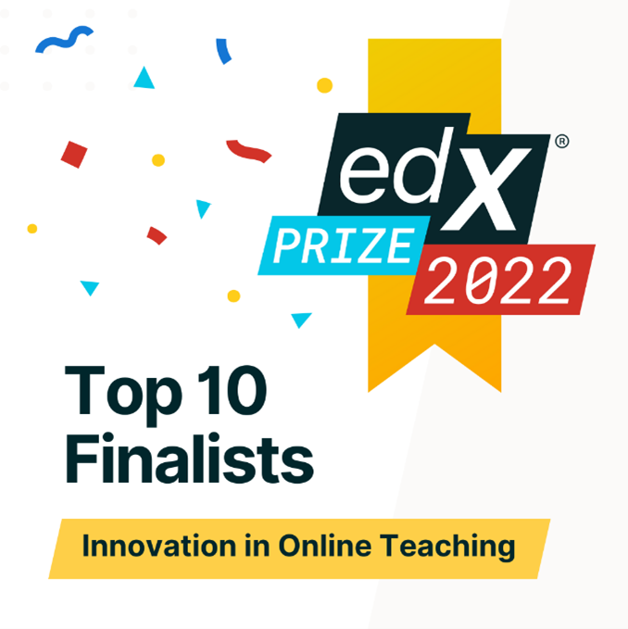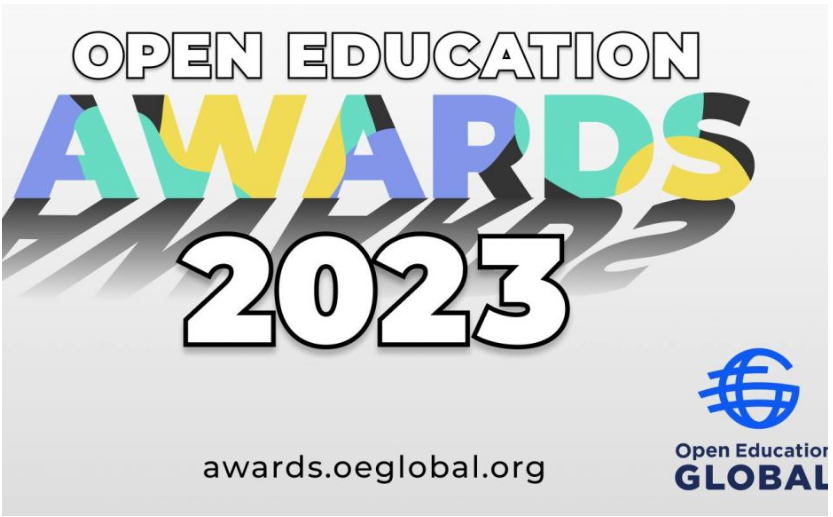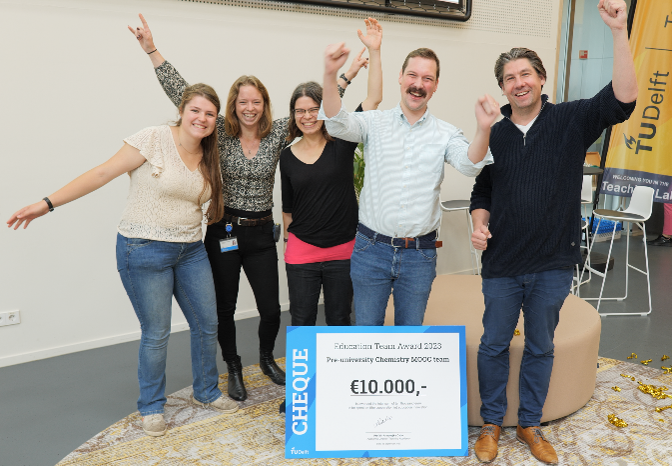
Annual Report 2023

Mission
This is the end of this chapter

Welcome
Welcome
A message from the Executive Director
As I reflect on the past year, I am very pleased with all that we accomplished in 2023. Our achievements go hand in hand with our ability to keep learners firmly at the centre of everything we do – staying true to our mission of educating the world and empowering individuals wherever they are to ‘make an impact for a better society’.
In April, the Executive Board approved the TU Delft Lifelong Learning Strategy, making the provision of post-initial education a core educational task of our university. This is an important step that further recognizes the value of such an offer in helping to collectively solve global challenges. It strengthens the impact we can have by extending the acquisition of knowledge and skills throughout one’s lifetime. It is a commitment that starts with educating new generations of engineers and continues after graduation by supporting our Alumni and thousands of adult learners.
As always, our development, growth, and success are due to the people in our teams and the colleagues we work with in faculty and in extended partnerships. I would like to thank each of them for their great work and dedication. Their passion and commitment to quality and best practices, significantly contribute to maintaining our university’s leadership in the sector. I commend them also for being an inspiration to others – be it as a conference speaker, participant in an innovation project, or an ambassador for open education – thank you.
I am proud that our endeavours to enhance access to quality education have again received international acclaim and some prestigious awards. Amongst these, the QS Reimagine Education Silver Award for our Medical Technology portfolio, and the Open Education Award for Excellence for the open-licenced image bank WeLikeSharing.
In line with our strategy and strong drive for innovation, we spearheaded new projects and collaborated in local, national, and global initiatives. In particular, I wish to cite our undertaking for ‘Future Skills for Engineers and Scientists’ within Enhance, an alliance of 10 leading European universities of technology. And also, the project Energy Transition: Talent for Learning Communities. With a focus on solar, wind, and green hydrogen, this brings together students, researchers, industry professionals, and others to learn and innovate by collaboratively solving problems along the value chain of the energy transition. Additionally, we continued our involvement in the Digital Credential Consortium and extended the number of courses offering Microcredentials. All these activities are instrumental in addressing the skills gap and responding to the future labour market, whilst promoting accessibility and relevance in an increasingly digital world.
To better support faculties and help deliver dynamic and engaging teaching and learning experiences, we further strengthened our Quality Assurance processes and published accessibility guidelines for our education in line with our D&I vision and implementation plan – always striving to benefit all learners.
Thinking of tomorrow, the Extension School remains committed to the evolving landscape of lifelong learning and its growing importance on national, European, and international agendas. We are poised to play a pivotal role in shaping its future and are excited about the opportunities that lie ahead to further advance education and empower professionals worldwide.
Willem van Valkenburg
Extension School Executive Director
This is the end of this chapter

Strategy
Strategy
- Develop and realise the university strategy towards LLL and continuing professional education in collaboration with faculties, the university corporate office and industry
- Advocate the mission of the Extension School
The publication of the University strategy for lifelong learning signaled that TU Delft’s commitment to collectively achieve impact for a better society cannot prescind from the provision of post-initial education. Making lifelong learning (LLL) a core educational task recognizes that our contribution to solving today’s pressing global challenges does not stop when a student graduates.
As a university, we have the responsibility to continue to provide adults and working professionals with the (latest) knowledge and expertise to support them in their personal development and careers. Such vision also well answers the call from national, European and international institutions and policy-makers who increasingly look at LLL as a means to help bridge the skill gap in the labour market whilst facilitating access to critical jobs, for example in the energy transition and for society’s digital transformation. To further the impact of its offer, the Extension School continues to take the lead and be involved in several important projects, some of which are highlighted below.
LLO Katalysator project
The LLO Katalysator (Lifelong Learning Catalyst) project is part of the larger National Growth Fund by the Dutch government and is specifically earmarked to ensure that all professionals in the Netherlands have access to training to build the relevant skills, knowledge, and competences for current and potential jobs both domestically and internationally. Allocating a total of €421 million, it is organised into three building blocks to meet identified national challenges in lifelong learning:
- Creating insights into demand for labour in the future;
- Ensuring a sufficient supply to meet this demand; and
- Developing an adequate learning culture to support it.
To carry out the university’s Lifelong Learning Strategy, the Extension School applied for funding within building block three, aiming to strengthen the infrastructure, further professionalise its workforce, anchor lifelong learning in the organisation, and ensure that its portfolio of courses meets the current and future needs of key sectors, addressing environmental and societal problems. The decision for the allocation of funds will be made in early 2024, and with a solid proposal, we believe to have good reasons to be successful.
We are also putting together a bid for a grant in building block two, to provide solutions for bottlenecks in appropriately skilled labour in the energy and raw materials transition. The application will be submitted in 2024.
Boosting employability for the Energy Transition
Having well-trained employees with the right knowledge and skills in the energy transition sector is essential for a successful shift to a low-carbon economy. To accomplish this, in 2023, the Economic Board of South Holland set up the Energy Switch Zuid-Holland initiative. Led by the Extension School, this aims to enhance collaboration between existing initiatives focused on reskilling and upskilling to meet future market demands, including transitioning to new jobs in the sector. It is a key part of the Growth Agenda within the Human Capital Agreement of this region. Over 20 organisations have joined the initiative; they comprise a diverse group of partners: training institutions, universities, government bodies, companies, and business associations; Visit the project website (in Dutch) for more information.
TU Delft Lifelong Learning Strategy
With the approval of the Lifelong Learning Strategy by the Executive Board on 18 April, continuing education was cemented as a core task of the university. Thanks to its decade of experience and a dedicated range of centralised services, the Extension School will continue to help all faculties develop and deliver a portfolio of courses and programs that complements their world-renowned education and research expertise.
This enables faculties to fulfil the university's LLL mission of providing adult learners with quality and accessible learning opportunities for professional and personal development throughout their lifetime within the context of Science, Engineering, and Design, to build a better society together. The portfolio further promotes the Delft Signature and brings added benefits to campus education, too.
Conferences and outreach
The Extension School is regularly invited to participate in conferences and events related to open and online education and lifelong learning. Attending and presenting at national and global events help raise awareness and showcase TU Delft’s vision and role in providing high-quality continuing education, whilst further building relationships for potential future collaborations. Since January 2023, we presented, gave keynotes, and were members of panels at several conferences, including:
- ICDE – International Council for Open and Distance Education
- EUCEN – European University Continuing Education Network Conference 2023
- EDEH – European Digital Education Hub
- EMOOCS 2023
- EDEN – European Distance and E-learning Network Annual Conference 2023
- IEEE – LWMOOC (Learning with MOOCs) Conference 2023
- OE Global Conference 2023
This is the end of this chapter

Education
Education
- Develop and deliver continuing education in alignment with the University’s strategy and in collaboration with the faculties
- Manage the Quality Assurance of the Extension School's portfolio
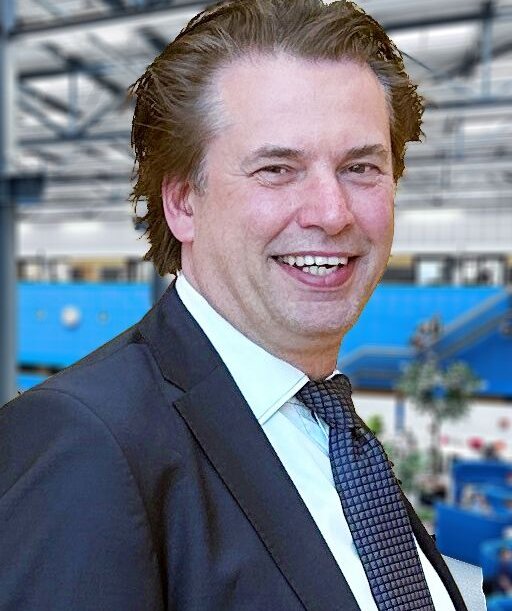
Arno Smets
Director, Extension School Education
“Our university is a hub of innovation and excellence, and I believe it is our responsibility to extend this wealth of knowledge beyond our campus and enrich the personal and career development journeys of thousands of learners across the globe. Whilst we equip professionals with the expertise and practical skills they need, such endeavour also enhances the teaching capabilities of our lecturers and strengthens our education."
"By creating and delivering lifelong learning courses, our faculty can refine their skills, stay updated with the latest pedagogical advancements and tools, and bring fresh perspectives back to our on-campus programs. The benefits are further extended by our participation in initiatives and consortia with other top institutions and industry partners."
"It fills me with pride to see the drive, commitment, and collaborative effort that our lecturers and staff put into delivering a lifelong learning offer that bridges the gap between theoretical knowledge and practical application. This means that the courses we provide are not only academically rigorous but also highly relevant to real-world issues – helping professionals tackle the grand challenges of today and tomorrow. Whether it is addressing environmental sustainability, advancing technological innovation, or improving societal well-being, our portfolio is designed to make a significant impact for a better society."
Focus areas for a better society
The portfolio of online courses and short programs is developed in close collaboration with TU Delft's faculties, integrating academic expertise and insights from the latest research with market and learner needs. It encompasses themes related to today's major challenges to help professionals address these with relevant skills and practical solutions. They focus on critical transitions affecting society – such as digitalisation and the use of AI – and on the creation of a more sustainable world. Aimed at facilitating the move toward greener energy systems and circular economies and cities, they cover a full array of topics, from transportation to the use of big data, from cybersecurity to manufacturing, from healthcare and medical technology to zero-energy buildings and wastewater treatments – to mention just a few.
A strategic roadmap guides the development of the offer to ensure it links and contributes to the UN Global Development Goals. Through this approach, we support the university's priorities whilst remaining attuned to industry developments and the evolving needs of individual learners.
New courses and initiatives
In 2023, we expanded our reach by launching several new courses (listed below) and products such as the joint program on Water & Strategy Planning – and by participating in various initiatives. Amongst those described in this section, notable are the LLO Katalysator and the international projects on digital certification and Microcredentials. Meanwhile, we continued to enhance campus education and the support we provide to faculties and lecturers to give all learners a great learning experience.
For our full course offer, visit our catalogue.
New courses by theme in 2023
Quantum Technology
- Development and Applications of Germanium Quantum Technology
- Machine Learning for Semiconductor Quantum Devices
Medical Technology
- Biomedical Equipment: A Practical Approach to Healthcare Technology Management
- Circular Strategies for MedTech Suppliers
- Circular Strategies for Hospitals
- Kinematics: Analysis and Interpretation of Human Motion Data
Skills for Engineers
- Calculus I: From Functions to Differential Equations
- Calculus II: Multivariable Functions
- Linear Algebra I: Vectors and Linear Equations
- Linear Algebra II: Matrices and Linear Transformations
- Modern Distributed Systems
- Pre-University Chemistry
- Probability Theory
- Statistics
IHE-TU Delft joint program
The new Water Strategy & Planning program launched in March with 30 registered learners. Aiming at reducing the skill gap in water management, it has proven particularly attractive for practitioners from the Global South who can thus gain easier access to much-required expert knowledge for their localities. It is the result of a valuable collaboration between our university and another leading institution with expertise in this sector – the Delft Institute for Water Education.
Digital certification and microcredentials
As the interest and potential value of digital credentials increase at national and supranational levels, we work to deliver on such forward-looking formats. As a founding member, we are active in the Digital Credential Consortium of 12 leading universities to exchange digital data and use the blockchain to create a trusted, distributed, and shared infrastructure as a standard for issuing, storing displaying, and verifying academic credentials digitally.
Nationally, we represented TU Delft in a pilot involving over 30 institutions to establish a framework for issuing Microcredentials (MC) in the Netherlands. An MC is a digital certificate awarded for a small unit of education, typically ranging from 84 to 840 hours (equivalent to 1 to 3 ECTS credits). It is awarded as an edubadge, and is recognised as reliable, accreditation-worthy education. MCs are a quality mark: verifiable, portable, and do not expire. In 2022, we offered five courses with this certification, and following the successful completion of the pilot, we plan to expand this to more. Visit the website for the current offer.
ENHANCE – future skills for Europe
ENHANCE is an alliance of 10 European universities of technology, part of the ERASMUS+ program, with a strong focus on innovation and research. It aims to enable the seamless mobility of students, researchers, and staff to leverage technological know-how to address the challenges of tomorrow and advance a sustainable digital and social transformation.
TU Delft leads the work package 'Future Skills for Engineers and Scientists,' where we play a vital role in identifying the essential career-long skills and competences that STEM graduates will need, and in ensuring that innovative teaching and learning formats meet those needs. For them to thrive and remain competitive in a resilient, global, and value-based European society.
TU Delft Exchange Weeks
Twice every year, in conjunction with the TU Delft Teaching Academy, we host an event for external higher education institutions interested in learning more about educational innovation at our university. The focus is on sharing experiences and best practices to facilitate and motivate innovation in education. Our dedicated sessions highlighted how to support and organise online education for lifelong learners.
The event attracted over 30 attendees, including representatives from Aalto University, Politecnico Torino, AGH University of Science and Technology, Universitat Autónoma de Barcelona, SRH Berlin University of Applied Sciences, and the Technical University of Denmark.
"The TU Delft Exchange Week offered the unique chance to share best practices and processes. It was truly inspiring!"
Swiss Federal Institute of Technology
"The best thing about the visit was to gain insight into TU Delft's explicit strategies and approaches for online and blended learning. Highly recommended."
University of Southern Denmark
Digital platforms for campus education
We continue to support faculties by overseeing the successful integration and operation of numerous online campus courses across several dedicated digital platforms. This offer comprises MOOCs and other online formats for prospective TU Delft students, including selection, taster, and bridging courses – for a total of 140 different courses and 11,172 enrollments. Our support covers supervising the installation, optimisation, and maintenance of the platforms and servers to ensure the continuous availability of essential tools and applications.
Additionally, we provide regular expert advice to TU Delft lecturers on delivering high-quality learning experiences, boosting student engagement, and adopting new educational tools. This support includes educational webinars and specialised training such as Designing and Teaching an Online Course.
Training & development for employees
TU Delft’s training and development platform offers employees the opportunity for continuous development, covering a wide range of personal and professional skills. Since its inception in 2022, employees have engaged with 50 of the 53 online courses offered by the Extension School, resulting in close to 400 enrolments.
The commitment to fostering a culture of continuous learning and improvement at The Extension School is evident through these initiatives. By providing robust support and a wide range of learning opportunities, we empower both our staff and students to excel in their respective fields.
STAP subsidy
Under this name, the Dutch government launched an initiative and allocated funds to support employed and unemployed professionals in following training to enhance their skills and improve their position in the job market. We offered an initial, small selection of courses with the intention of expanding their numbers in the future, depending on the scheme's longevity.
We received 37 applications for our courses on Road Safety and Cybersecurity for Managers and Executives; unfortunately, due to the overwhelming interest in the funding, only five of those were successful in obtaining the subsidy.
Scholarships
Our mission is straightforward: to create a positive impact on education, enrich the lives of learners, and contribute to global progress. By attracting learners from all corners of the world, we strive to make high-quality education accessible to all, including those who cannot afford course fees.
Currently, there are different types of financial assistance available to our learners (criteria-based), and we are looking at ways to increase this type of support in the coming year so that more people can positively impact their communities.
10-Year MOOC Anniversary
15 September marked the launch, 10 years ago, of TU Delft’s very first two MOOCs: Introduction to Water Treatment and Solar Energy. Since then, our university’s online continuing education has grown from those two MOOCs into a broad offering of close to 250 courses and about 50 programs by all of its faculties – and reaching over 3.7 million learners worldwide! A fantastic growth and outreach that contributes to our vision for ‘learning for life’. Congratulations to our pioneering lecturers! Find out more about the impact 10 years on.
Net Promoter Score
The Net Promoter Score (NPS) is an index ranging from -100 to 100 that measures the willingness of customers to recommend a company’s products or services to others. It is used as a proxy for gauging the customer’s overall satisfaction with a company’s product or service and the customer’s loyalty to the brand.We ask the following NPS question and achieve very good scores across our portfolio.“Based on your complete experience with TU Delft Online Learning, on a scale from 0-10, how likely are you to recommend us to a friend or colleague?”
Find out more
This is the end of this chapter

Innovation
Innovation
- Act as innovation hub for education

Sofia Dopper
Manager, Education Support
"Our commitment to excellence drives us to continuously explore and implement new educational strategies, formats, and technologies and this makes innovation part and parcel of how we work. We seek opportunities for improvement and apply learning from our educational research and collaborations with others. This ensures that our educational offer is creative and effective in addressing modern learning needs and that our learners benefit from the latest advancements and best practices.
"In addition to our internal efforts, I am proud of our role as a sought-after partner in various consortia. Our collaborations have been instrumental in securing external grants and executing novel projects. These often focus on developing new digital educational formats and credentials, as well as creating training communities and networks. One such project initiated this year is the Energy Transition Talent for Learning Communities, which engages students, lecturers, sector companies, and social institutions along the value chain of wind, solar, and green hydrogen. Amongst our experiments, I would highlight two very different but equally exciting ones, the pilot use of the SketchDrive tool in 10 different campus courses, and the robotic AdLap Systems for advanced laparoscopy procedures.
"In 2023, the Extension School continued to advance forward-thinking education on a global scale, and by continuously pushing the boundaries of innovation, we strive to make a meaningful impact on the future of education and professional development worldwide."
AdLap Systems for advanced laparoscopy
Part of a proposal by the Dutch Research Council (NWO) under the Knowledge and Innovation Agenda (KIA) for Key Enabling Technologies, the initiative brings together research and technical savvy from TU Delft with health sciences expertise from Medical Centres and hospitals in the area, such as the Amsterdam and Leiden Universities Medical Centres, and the Reiner de Graaf and Haga Hospitals.
It aims to revolutionise laparoscopic surgery with an advanced modular robot platform. With a focus on affordability and sustainability, the hand-held and cable-less instruments that control the device are fully reusable, easy to clean, and environmentally friendly – making this type of surgery more accessible to hospitals worldwide.
Energy Transition - Talent for Learning Communities
One of the innovation projects we led in 2023 sits within the Dutch Research Council’s Knowledge and Innovation Covenant (NWO KIC) to stimulate the collaboration of different parties in the energy transition. The Energy Transition – Talent for Learning Communities specifically focuses on establishing learning communities to work on projects relating to green hydrogen technology, wind energy, and solar energy; it brings together companies in the energy value chain, educational institutions, local governments, professionals, and citizens.
Through their collaboration and expertise, such a diverse group of actors creates a new learning environment and innovation hub, allowing a more profound look at the problems and potential solutions. For project details, visit the website (in Dutch).
Sketchdrive for campus
One of the ways we are extending the benefits of online education to our campus students is by deploying new tools for their degree programs. For example, last year we started an exercise to use Sketchdrive in 10 campus courses, with a view to expand this availability in the future. The tool enables students to visually share work and give feedback, enhancing peer-review and promoting the building of a communal visual database. Experts from the Extension School worked with the provider and faculty course developers to test and develop new features and improvements, ultimately creating a roadmap for tool development.
Grasple for Maths MOOCs
Grasple is an innovative online platform that allows lecturers to discover and create open interactive math and statistics exercises, which they can easily share with colleagues and students. Adopting Grasple into six Mathematics MOOCs has allowed us to engage our students with practice maths exercises more effortlessly.
Find out more
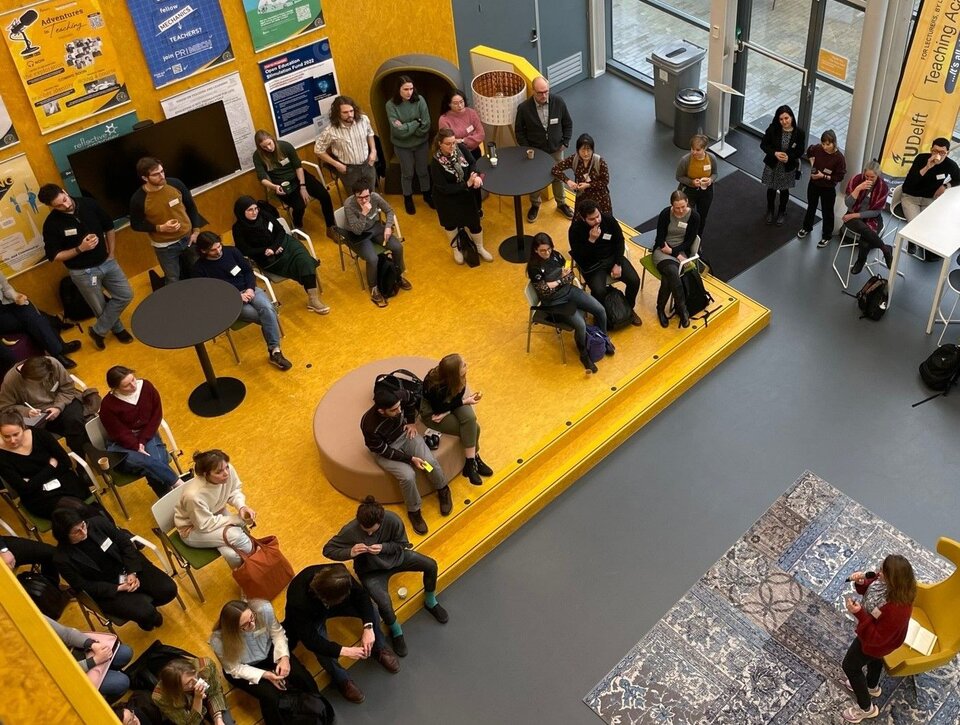
Innovating education
TU Delft Exchange Week
Personal evolution in the age of AI
This is the end of this chapter

Research
Research
- Facilitate research to improve our continuing and campus education
Research in education and learning analytics are key factors in our ability to innovate. We are open to experimentation and new ideas. At the same time, we are experienced in creating different educational formats and we put our expertise to the service of learners.
Research Agenda 2023-2028
Our lifelong learning courses and programs are designed with a learner-centered approach to meet the needs of each individual. And such needs, due to personal circumstances, developing geopolitics, shifts in the labour markets, and the emergence of new technologies, are varied and constantly changing. To remain flexible and able to meet this educational challenge, we have revised and updated our Research Agenda to focus on four crucial areas.
1. Educational research to build knowledge and shape evidence-based practices for innovation in education.
2. Development and innovation to implement insights, new methods and tools.
3. Portfolio and customer-focused research to evaluate the learner experience for inclusive and impactful education.
4. Measuring the impact of our courses and programs on how they benefit our learners and equip them to solve societal challenges.
Our online education generates massive amounts of data on student behaviour and salient data sets can be used to gain knowledge on learning processes to improve the student experience and pedagogical outcomes. We have several research agreements with international institutions, such as Monash University, and offer academics the opportunity to work on pioneering science and education, applying derived insights to improve the quality of education, for our online learners and for our campus students, too.
100 DAYS OF... Data for Learning
Together with the TU Delft Teaching Academy, Teaching & Learning Services, the 4TU Center for Engineering Education, and the Leiden-Delft-Erasmus Center for Education and Learning, we ran the ‘100 DAYS OF... Data for Learning' initiative. Through a series of events, activities, and interactive sessions – including three international keynotes and eight workshops – we collaboratively explored the use of data in engineering education.
Over the three-month project, we focussed on creating awareness about the possibilities and restraints of data in teaching and learning, and highlighted cooperations amongst organisational units involved in educational innovations in this context. The insights and findings from the initiative were combined in a whitepaper.
Research papers
Our findings were published in academic journals and presented at conferences; below is a short selection.
Impact of MOOCs and Other Online Course Development on Campus Education – by Selma van Esveld, Nardo de Vries, Sibilla Becchetti, Sofia Dopper, and Willem van Valkenburg
Published in November and presented at EMOOCs 2023 in Potsdam, it examines whether the creation of online courses had an impact on campus education. In-depth surveys with 68 lecturers showed that the experience and skills gained from developing online course materials benefited their campus education.
Enhancing quality assurance in continuing education through an organisational cultural change – by Clelia Paraluppi, Patricia Mancebo May, Ceyrine Pellikaan, and Naomi Wahls
Published in December as part of the EUCEN Conference 2023, it describes the collaborative process the Extension School for Continuing Education underwent to strengthen its quality culture involving professionals and leaders working on designing, developing, and delivering its online courses.
Online professional development across institutions and borders – by Bart Rienties, Blazenka Divjak, Michael Eichhorn, Francisco Iniesto, Gillian Saunders-Smits, Barbi Svetec, Alexander Tillmann, and Mirza Zizak
Due to the desire, potential, and need for collaboration among educators to learn from innovative and best practices, several institutions have started to pool their resources and expertise to implement cross-institutional and cross-national online professional development (OPD). This case study, published in June 2023 as part of the EU-funded project ‘RAPIDE’, and spanning educational institutions across three countries, explores the lived experience of 68 educators as a result of these efforts.
The Use of Digital Peer Assessment in Higher Education: An Umbrella Review of Literature – by G. van Helden, V. van der Werf, G. Saunders-Smits, and M.M. Specht
Faced with increasing student numbers, digital peer assessments can provide an effective and scalable way of giving feedback. Published in March, this umbrella review of 14 papers on the use of (digital) peer assessment in education will assist educators in finding or developing a tool that fits their needs.
This is the end of this chapter

Business
Business
- Brand, market and promote the Extension School's portfolio
- Manage and run the Extension School's administration including enrollments, payments and issuing certificates
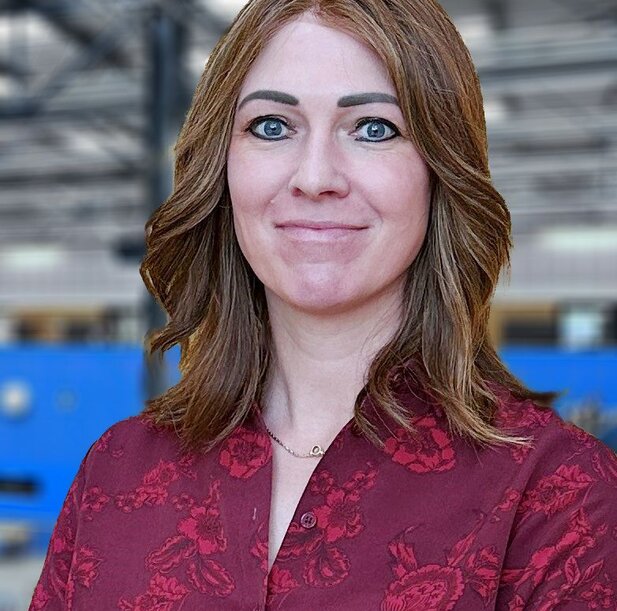
Maaike van Buul
Manager, Business Development
“Quantitative data and testimonials from professionals highlight our successes and drive us to continuously evolve, ensuring we remain responsive to their current and future needs. In 2023, this meant ramping up our efforts in marketing, communications, and portfolio strategy while continuing to try out new approaches and tools to make our customers’ experience even better.
"Central to our initiatives was the further broadening of our offer with over 20 new courses, a stronger focus on B2B activities, and a close alignment with the evolving needs of professionals and the market at large. Our efforts included the in-depth review of our whole portfolio to analyse performance and steer for improvement. Additionally, we defined impact strategies for all our portfolio themes to ensure their clear contribution to making an ‘impact for a better society’ from the perspective of lifelong learning. We applied our data-driven approach also to our branding strategy to foster recognition and buy-in with all our stakeholders, as well as in the design of new products and content-related webinars to expand our reach.
"I am very pleased with how, throughout the year, we remained steadfast in our commitment to refining reporting and management information cycles, as well as improving our quality management and the seamless administration of new offerings, such as Microcredentials. Naturally, we also continued to invest in the professionalization of our growing team and participated in national calls for proposals to respond more effectively to evolving trends and demands. All this further bolstered our brand presence and credibility.
"After such a successful year, we are looking forward with confidence to further enabling learners succeed in today’s dynamic professional landscape."
Higher group and program enrollments
During the year, we registered a small decrease in enrollments in single courses. This was the combined result of a global dip affecting most MOOC providers worldwide and of the revamping (and thus temporary unavailability) of a couple of our in demand professional education courses. However, the total of participants in our programs grew by 10%, as did the percentage of program certificates (+22%).
Enquiries from companies for training for their employees remained relatively steady throughout, with a higher number of initial contacts for information resulting in conversions to group enrollments – and with higher numbers of participants – compared to previous years. In particular, we registered an increase of repeat business from satisfied organisations, alongside a growing request for specific courses and webinars.
Amongst our clients, notable this year, was a request for group enrollments by NATO for courses on nanofiltration.
The deployment of a new B2B form also significantly improved group registration flow and lead generation.
In loco summer course
At the heart of our initiatives was the expansion of our portfolio with the delivery of over 20 new courses, and the launch of a new lifelong learning offering: the Summer Course on Risk Management in cooperation with the faculty of Industrial Design Engineering, to be held face-to-face on campus at the end of June 2024. This 2-week course is highly interactive, with team-based exercises, brainstorming sessions, discussions, and other engaging training techniques. Designed for those working in the field regardless of industry, level of experience, and background, it helps keep professionals up to speed with the latest developments.a
Expert webinars for community engagement
The Extension School organises webinars that are designed to connect current and prospective learners with industry experts, keeping them informed about the latest developments in their field. A useful component of our Lifelong Learning portfolio, these online events also give participants the opportunity of engaging firsthand with some of our courses’ content and to appreciate their value for acquiring new skills and achieving potential career goals. To add value to this offer, we began looking into the possibility of running them on a regular basis and in conjunction with upcoming faculty and university-wide initiatives. In 2023, the webinars were popular, with up to 450 registrations per topic:
-
Personal Evolution in the Age of AI, led by Derek Lomas, Assistant Professor at the faculty of Industrial Design Engineering
-
Advance Credit Risk Management, led by Dr Fang Fang, from the faculty of Electrical Engineering, Mathematics and Computer Science, together with Hervé Phaure, of Deloitte France’s Credit Risk Advisory Services.
New LinkedIn page
Already a success in its first month, with 700+ followers, a viral post with more than 70,000 impressions, 2,700 clicks to course pages, and 278 new followers in one day – our LinkedIn presence went live in June and continued to register great engagement. Over six months, we saw a gratifying 32% increase in followers, with their totals at the end of the year exceeding 1,700 – and growing.
This is the end of this chapter

Organisation
People and Community
The Extension School successfully meets its objectives and makes a positive impact on individual students, campus education, and the broader community through the expertise and commitment of its staff and thanks to strong collaborations with dedicated faculty members and external partners.
Collaboration and quality services drive our offer
We have achieved notable advancements by refining our quality control processes, expanding our course offerings, and continuously enhancing the educational experience for both lecturers and learners.
Our approach involves shared, collaborative ownership between the faculties and the Extension School. Faculties focus on developing course content, while our organization provides extensive centralized support for creating, delivering, marketing, and evaluating the courses and programs. We manage processes and quality monitoring, supported by our advisory and quality assurance boards. These include academic and industry members to ensure that our initiatives are well-aligned with both faculty strategies and external trends.
The type and level of dedicated support we offer faculties are described in our Service Guide. It comprises support for online education, and it extends to services for campus, hybrid, and face-to-face courses, as well as specific training in lifelong learning tools and techniques for the further professionalisation of our lecturers. The guide is regularly updated based on new products being developed and on requests from faculty.
Appointments
In line with our strategy and the broadening of our remit to support new projects and the implementation of the university's lifelong learning strategy, new colleagues joined our teams. Their positions are:
- Administration Officer
- Communications Officer
- Data Engineer
- 3 Learning Developers
- Policy Officer
- Product Owner Lifelong Learning Website
- 3 Project Managers: Energy Transition-Talent for Learning Communities, Enhance Alliance, and LDE-CEL Consortium.
We were also very pleased to welcome two external members of our Strategy Board: Didi te Gussinklo Ohmann – Project Director, Van Oord, and Miguel Delcour – General Manager, KIVI.
To meet all current colleagues, visit our People page.
Valued LET support
Since being set up in 2021 to support lecturers with the running and moderating of their courses (excluding Online Academic Courses), the demand for the services of the Learning Experience Team has steadily grown: at the end of 2023, it supported 70 course-runs. This is an 11% increase compared to Q4 2022 and a 24% average increase over the whole of 2023. Lecturers appreciate and value the work of the fully trained teaching assistants who take care of learners' engagement, the course evaluation process, and the updating of specific materials. This dedicated support frees up lecturers who remain ultimately responsible for their course content, whilst being relieved of extra operational work.
QA Standards & Guidelines
Our organisation is dedicated to continual improvement, upholding the relevance, quality, and effectiveness of our offerings. To cater to evolving educational demands and to enhance the learning opportunities for our diverse community of learners, in 2023 we reviewed our pedagogical model, ensuring it closely reflects the university’s vision on education and accurately adheres to our Quality Standards & Indicators. These were published together with a QA Handbook and help us benchmark and assess our activities across institutional, portfolio, and course levels.
Boosting accessibility
We also introduced Accessibility Guidelines and a relevant checklist to strengthen our commitment to making course content, websites, and third-party tools more accessible for all learners. This structured approach enhances our Quality Assurance System whilst aligning it with TU Delft’s established quality culture, activities, and policies.
A team committed to excellence
We are pleased to share the results of our first Quality & Workplace Culture survey whereby 80% of respondents rated the Extension School's quality culture as good or excellent. Furthermore, over 90% of our staff feel a strong sense of responsibility for the quality of their work and advocate for continuous improvements. A high majority, 93%, recommend the Extension School as a great workplace, reflecting our commitment to fostering a supportive and thriving environment.
D&I statement
We have set a clear commitment to inclusive education by developing our vision on Diversity & Inclusion (D&I). It is strongly rooted in the importance we place on the diversity of our learners for whom we strive to create an equitable environment - where they feel welcomed and supported, and where everyone can fulfill their potential irrespective of contextual circumstances or personal profile. We aim to enrich the learning experience by offering an inclusive learning environment, stimulating learners’ creativity, and improving their performance. Our vision is aligned with the central TU Delft D&I Office and will translate into a number of concrete initiatives in the coming years.
D&I update
The Extension School embraces a learner-centred, inclusive approach with a focus on diversity defined in our D&I vision. Our efforts centre on four key dimensions:
- Accessibility: ensuring fair access to resources, mobile-friendly content, offline materials, and continuous improvements to enhance the learning experience.
- Diverse learning: providing varied course content with real-world examples, fostering a sense of belonging, and encouraging interaction among learners.
- Gender equality: promoting increased female participation in STEM fields and maintaining a gender-balanced composition in course teams.
- Affordability: offering free audit tracks, open licensing, and financial assistance; aiming to be a beacon of diversity and inclusion in lifelong learning with equal opportunities for all.
In June, we held a dedicated quarterly session on D&I with an expert workshop, and the input was used to generate an implementation plan for 2024.
This is the end of this chapter

Impact
Overview of key impacts
At TU Delft, we realise an 'impact for a better society' through education, research, and innovation. In this context, lifelong learning activities support our alumni and other professionals in tackling global challenges relating to climate change, the energy transition, urbanisation, an increasingly digital society, and the provision of healthcare.
Professionals in science, engineering, and design or working in a technological context would be looking for methods, tools, and technologies, as well as updates and new perspectives in specific, core areas of expertise of the university – which we deliver through our continuing education portfolio. The development of this offer thus benefits from a future-proof and impact-driven approach.
Our approach led to a portfolio strategy inspired by the Theory of Change. In 2023, we started a process to support our Academic Portfolio Directors in organising the portfolio to more effectively steer its future development. The aim is to ensure that new topics and transformational learning activities added to it will fit within a coherent and highly socially relevant offer.
Each of the portfolio themes focuses on specific areas of change and supports professionals in making their impact for a better society, by contributing to creating new systems and solutions in the relevant sectors.
2023 process steps
identifying how each portfolio theme contributes to making an impact for a better society
Step 1
Determine the societal challenge each portfolio theme aims to contribute to.
Step 2
Select 4-6 areas of change that TU Delft can and wishes to make an impact on through its lifelong learning portfolio offer.
Step 3
Identify for each area of change which 2-4 changemakers would have the most impact.
Step 4
Describe each changemaker: who they are; where they are (industry sector, geographical spread); and what their roles and needs are.
Step 5
Combine the information into an impact strategy and implementation roadmap to drive the development of the educational offer of each portfolio theme.
This is the end of this chapter
Image credits (CC-BY): Taha Mazandarani on Unsplash, Maxim Kulikov on The Noun Project, Mello on The Noun Project, Cuputo on The Noun Project, dDara on The Noun Project, Abdul Latif on The Noun Project, Gregor Cesnar on The Noun Project, Marie van den Broeck on The Noun Project, Frengo on The Noun Project, Oleksandr Panasovskyi on The Noun Project, Freepik on Flaticon.

Awards
Awards
QS Reimagine Education
Our MedTech portfolio won the QS Reimagine Education Silver Award in the category Lifelong Learning. This award, bestowed by the organization behind the university rankings, recognises our MedTech portfolio for achieving a world-class standard in educational innovation, choosing it as one of the leading projects from a cohort of 1200. The award demonstrates how the groundbreaking educational offer meets the current needs of healthcare professionals whilst anticipating the challenges of the future – all in a sustainable way.
Top finalist in edX Prize
Jenny Dankelman and course team – Arjan Knulst, Amaya Schilder, and Devashish Mantri – made the Top 10 Finalists in this year award with their MOOC Biomedical Equipment: Repairing and Maintaining Biomedical Devices (faculty of Mechanical Engineering).
By empowering technicians and medical professionals worldwide with the understanding and the competences they need to keep their life-critical biomedical devices in working order – irrespective of locations and limited resources – it helps save lives: one device at a time, every day, everywhere.
OEAwards for Excellence 2023
The WeLikeSharing platform and photo competition led by Extension School's learning developer Bea de los Arcos, won in the Wild Card category. TU Delft employees, families, and friends are invited to submit a photograph that represents what openness means to them. These photos are shared publicly in the image bank on flickr.com under a Creative Commons license.
One of the jury members' descriptions: “An excellent initiative, build on democratic and participatory values … a really wonderful way to help anybody express in a visual way, share, and connect with others”.
TU Delft Education Team Award 2023
Recognising the innovative contribution to education and excellent cross-departmental work by the course team behind the Pre-University Chemistry MOOC (faculty of Applied Sciences). The team is now nominated together with colleagues from the MOOCs Pre-University Calculus and Physics for the national Education Team Award.
The winning team comprises: Volkert van Steijn (course leader), Cristiano Glessi (project manager), Robin de Kruijff and Rienk Eelkema (lecturers), Laura Janssen, Wilma Elston and Carola van Muren (education developers), Bijoy Bera and Yash Divekar (collaborators), Cees Breevaart, Stefan van der Griend, Bonny Klop and Jisca Barbian (teaching assistants).
This is the end of this chapter

Contact
Contact us
Email: extension-school@tudelft.nl
Telephone: +31 (0)15 27 89807
Building 32, Landbergstraat 15
2628 CE Delft, The Netherlands
Visit the Extension School website and our course catalogue.

